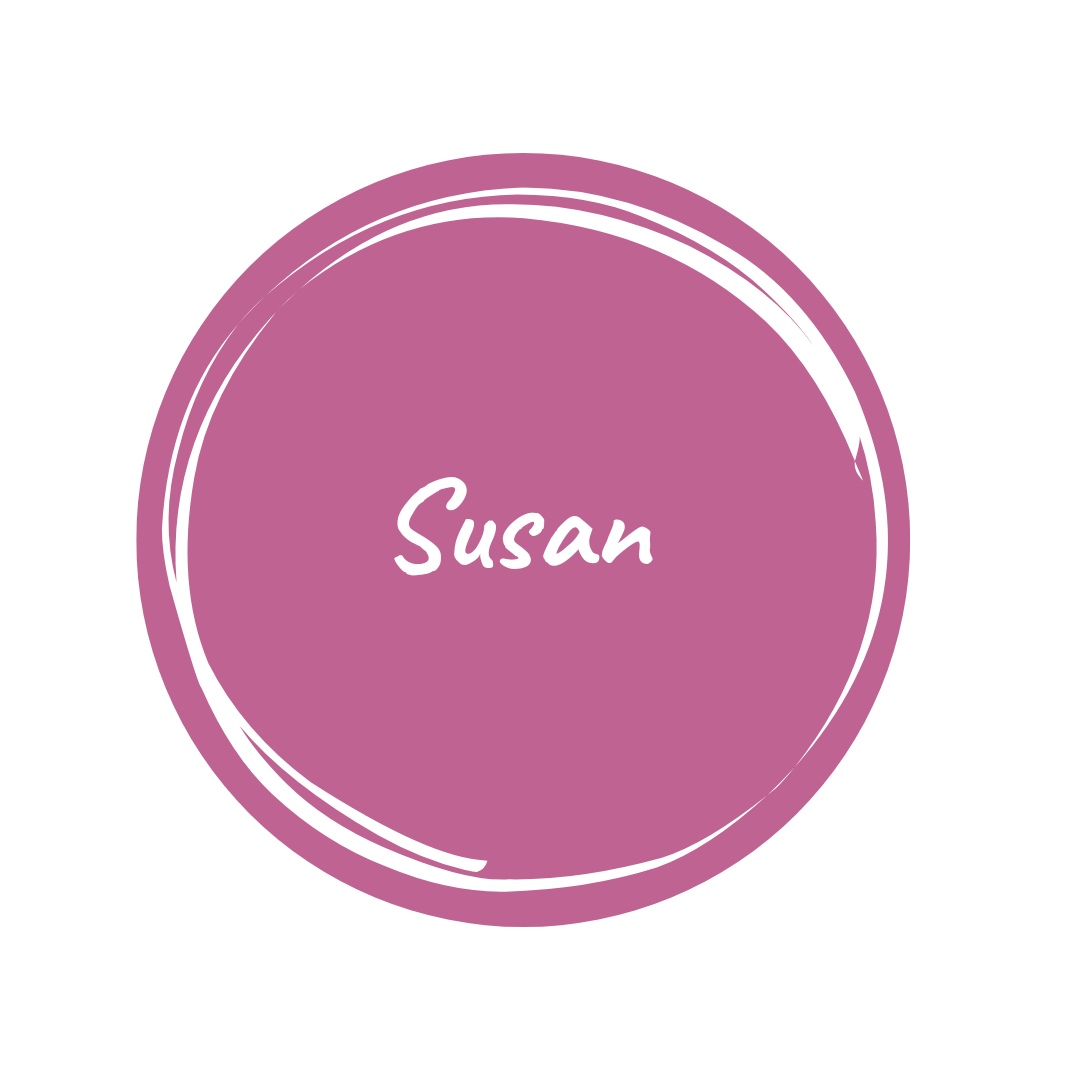- - -
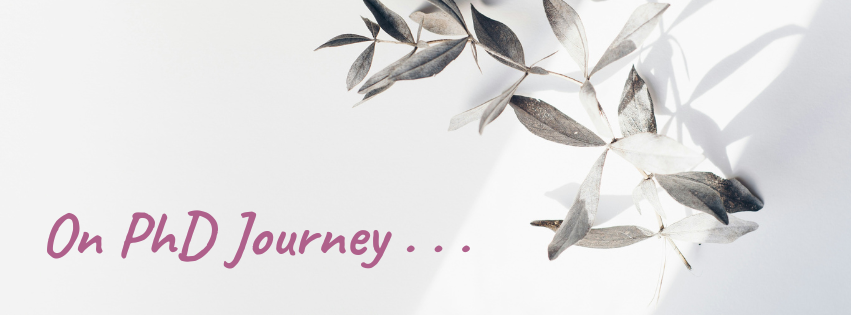
My thesis work — "The Normative Influence of Climate Movements on the UNFCCC COP Negotiations" focuses on how global norms by climate movements and transnational advocacy networks influence UNFCCC Conference of Parties (COP). The work is supervised by Prof. Viktoria Spaiser, Prof. Richard Beardsworth, and Prof. Cristina Stefan.
The thesis stems from the project "Understanding normative change to address the climate emergency" led by Prof. Viktoria Spaiser. See more:
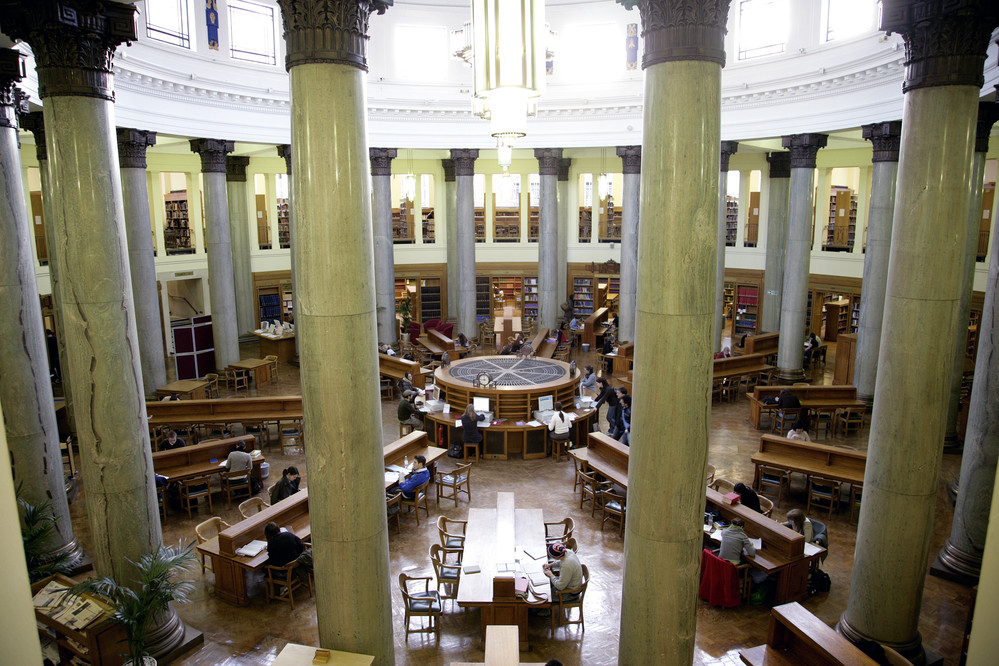
Time in University of Leeds was strengthened by my involvement with Priestley Centre for Climate Futures (see here). Further, publications so far directly and/or indirectly relates to the PhD work.
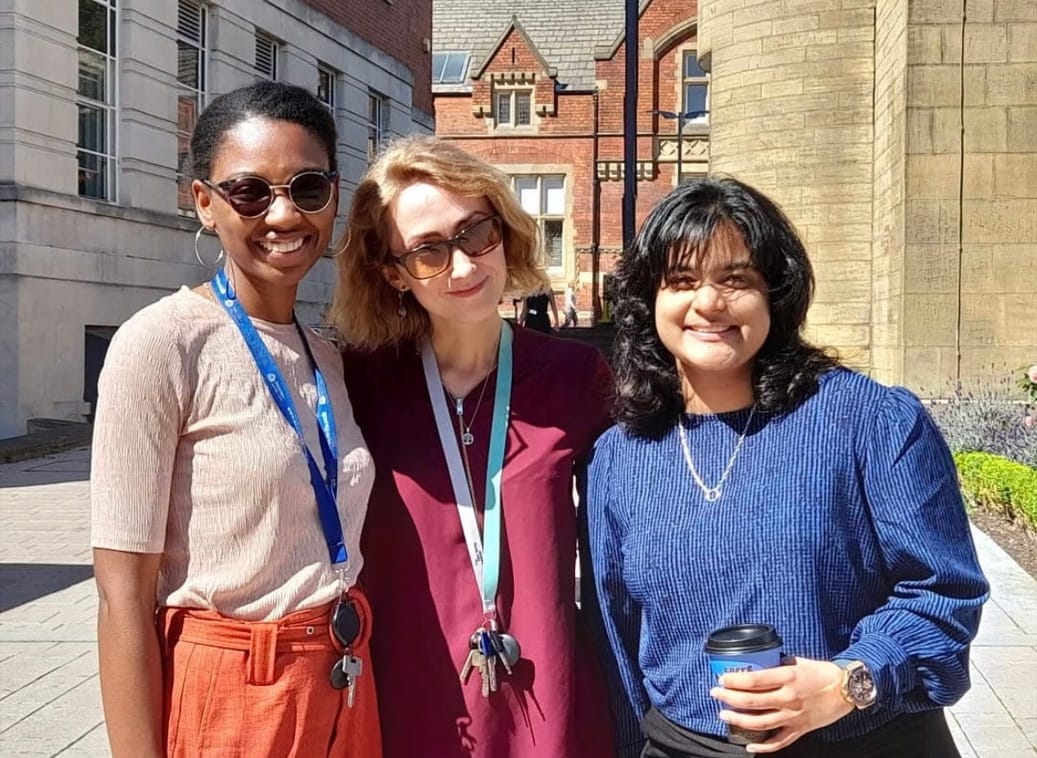
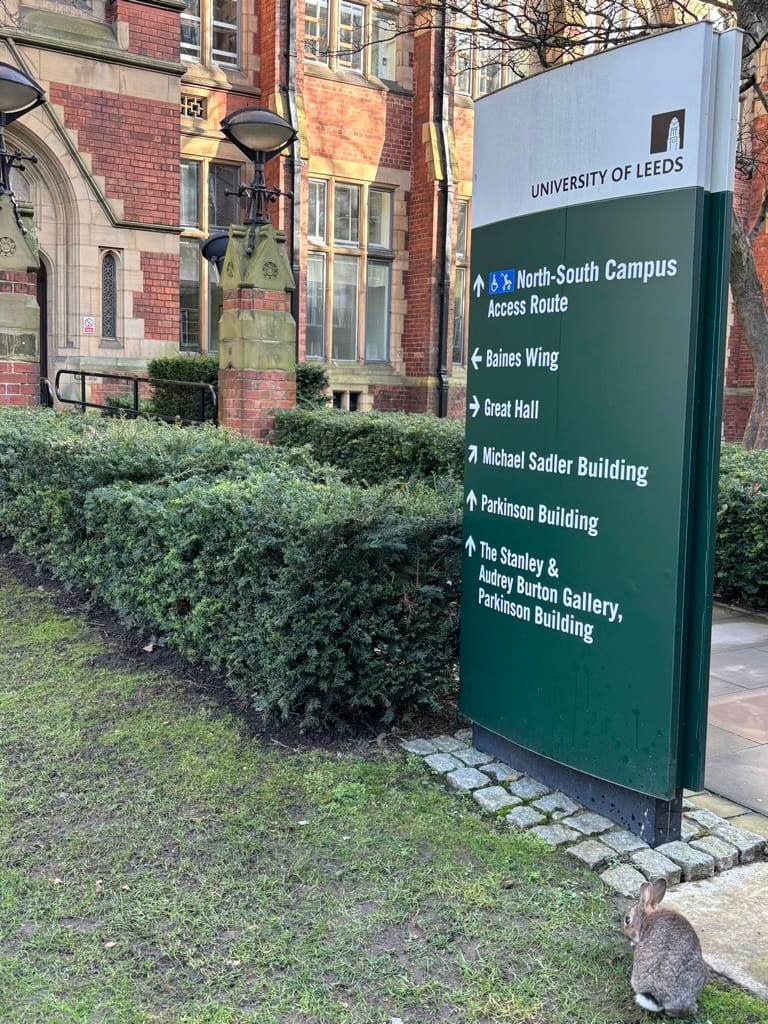
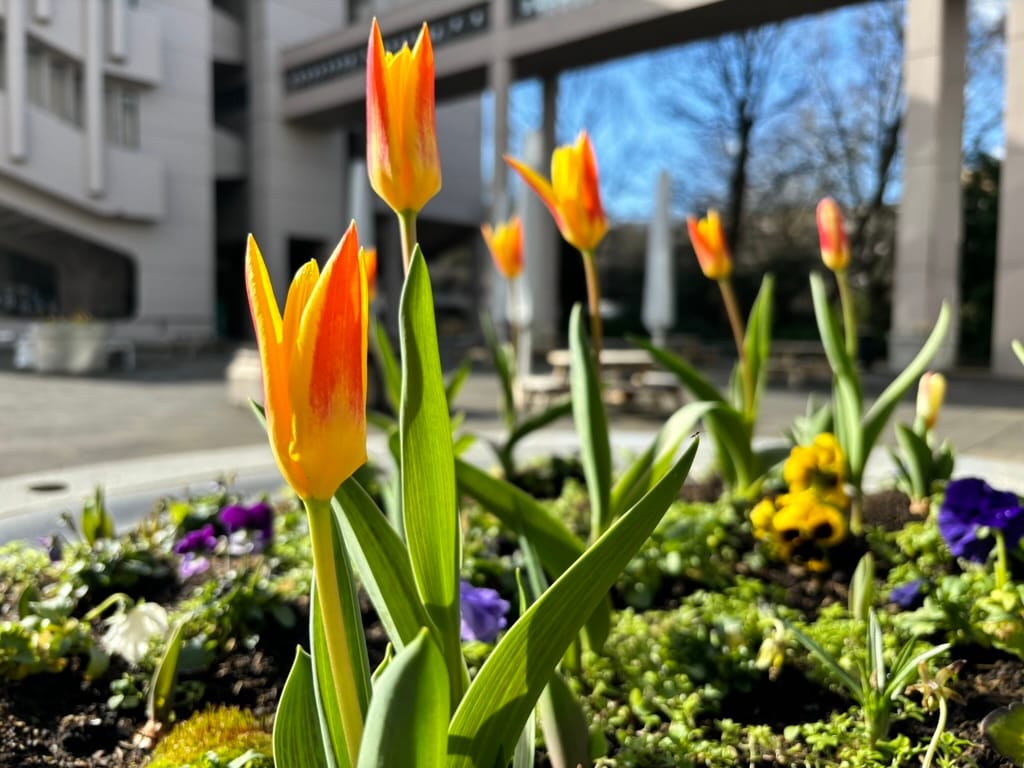
University of Leeds
Doing doctoral studies in University of Leeds - School of Politics and International Studies, has been a great experience—with the supportive environment of supervisors, mentors, and friends.
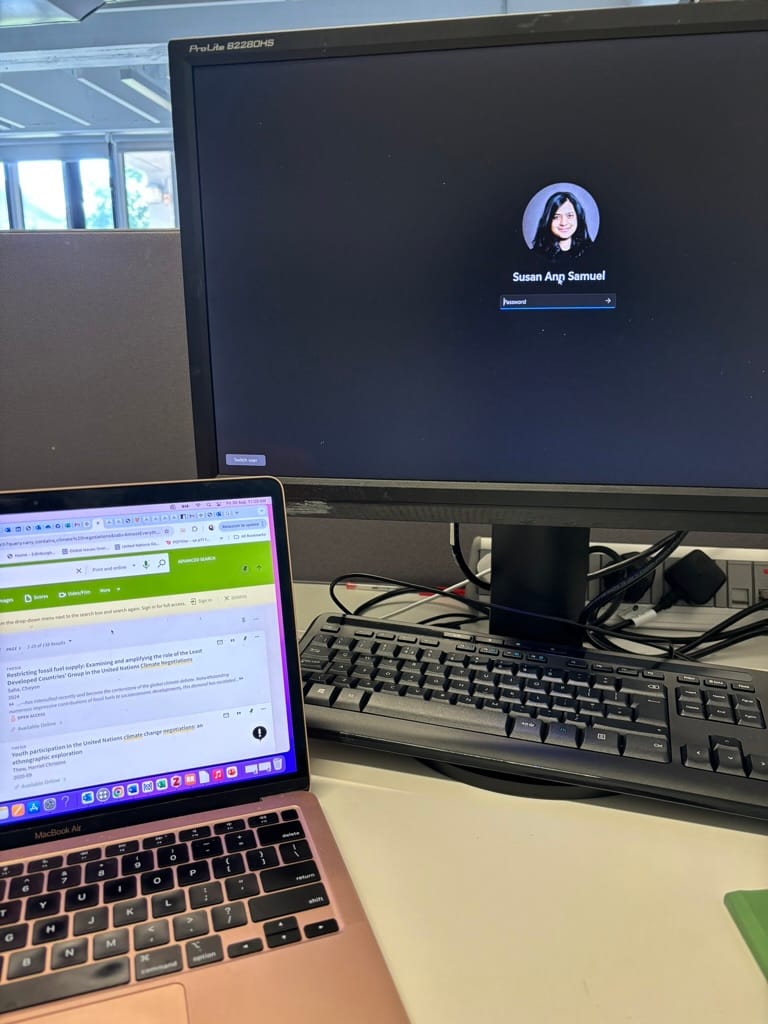
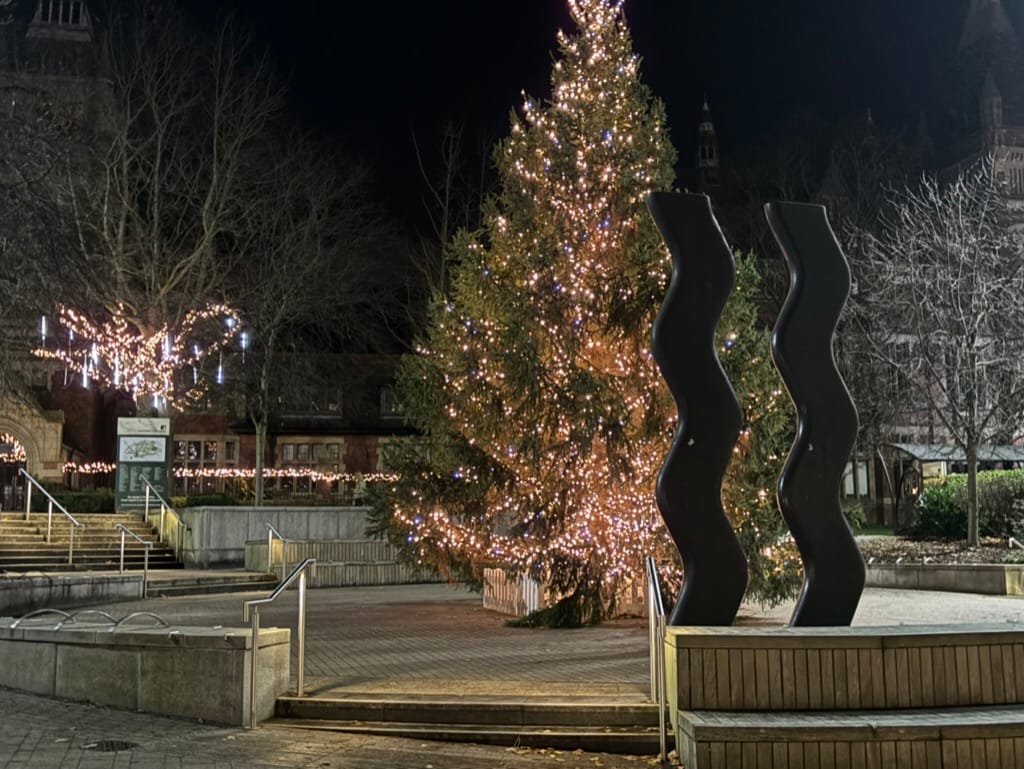
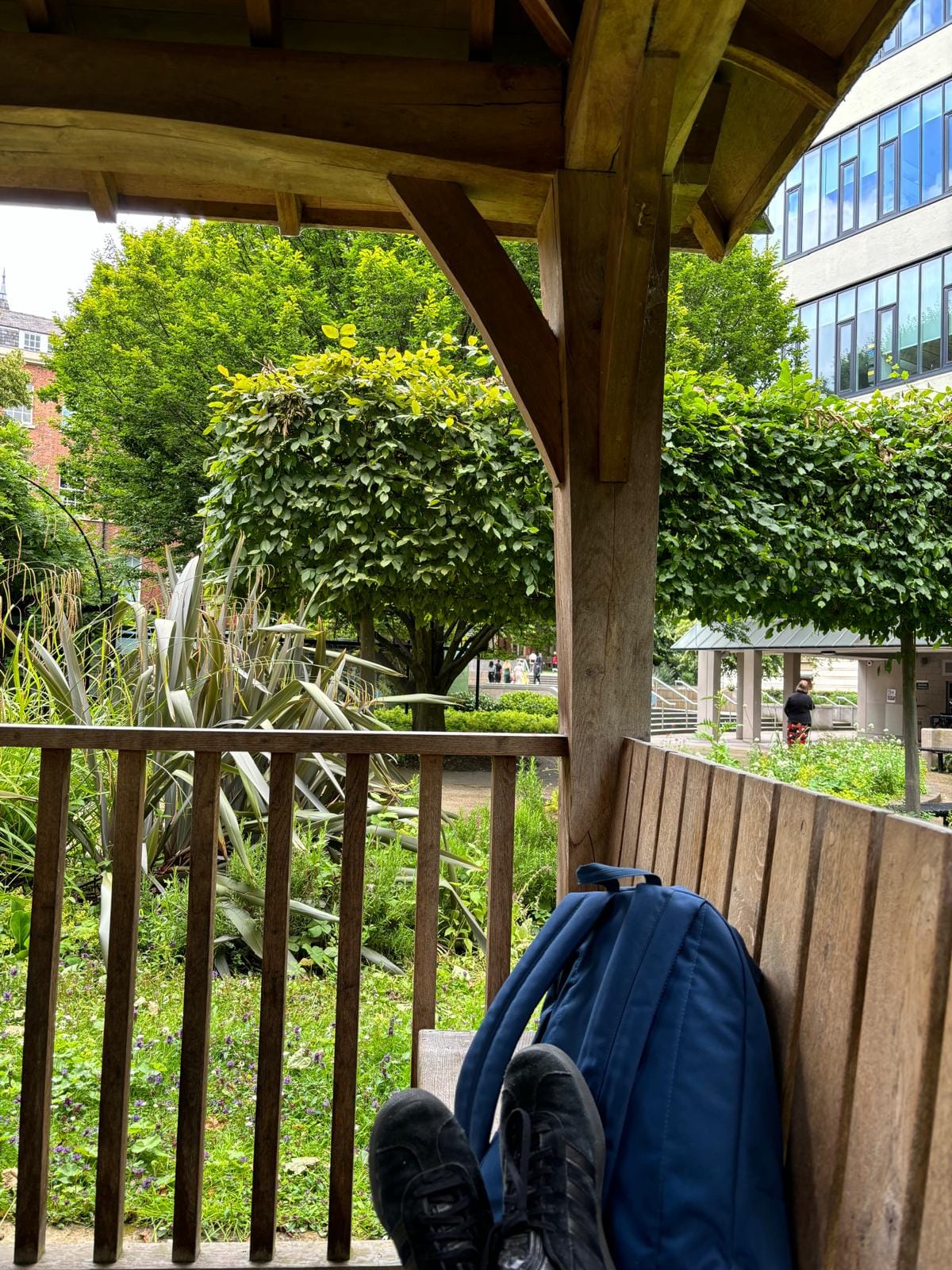
In Winter 2024
First Year (2022-2023)
First year was largely about getting to know the campus, the supervisors, the friends, the city, and to make new friends. I would say, I got lucky to be positioned in a project where my PhD thesis situates clearly—therefore, the intellectual demand was to get myself well-versed with the literature, the overarching themes, and to build the "argument". This was followed by an internal "Transfer" or an internal viva which makes you go through a rigorous process of getting ready with:
- Research Proposal
- A Sample Chapter (I did a Literature Review Chapter)
- I also had a document where I listed definitions of key terms which will later be covered in the Introduction Chapter (which however, wasn't necessary for the Literature Review Chapter)
I passed the Transfer and became "PhD Candidate" around July 2023.
First year had its struggle because, my academic discipline was Law, and doing a PhD in International Relations (IR) meant being intellectually agile in more than one academic disciplines. Gaining deep knowledge and insight in IR in limited time, and racing ahead for the high standards my supervisors expected of me, was tough but rewarding. It was a steep learning curve.
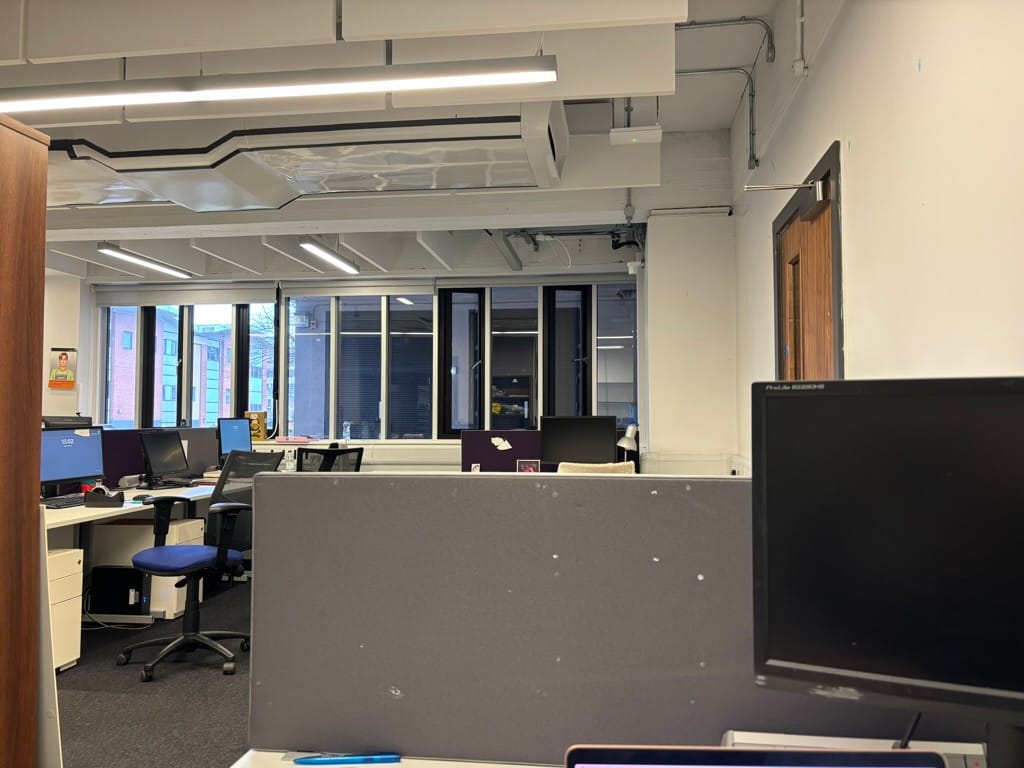

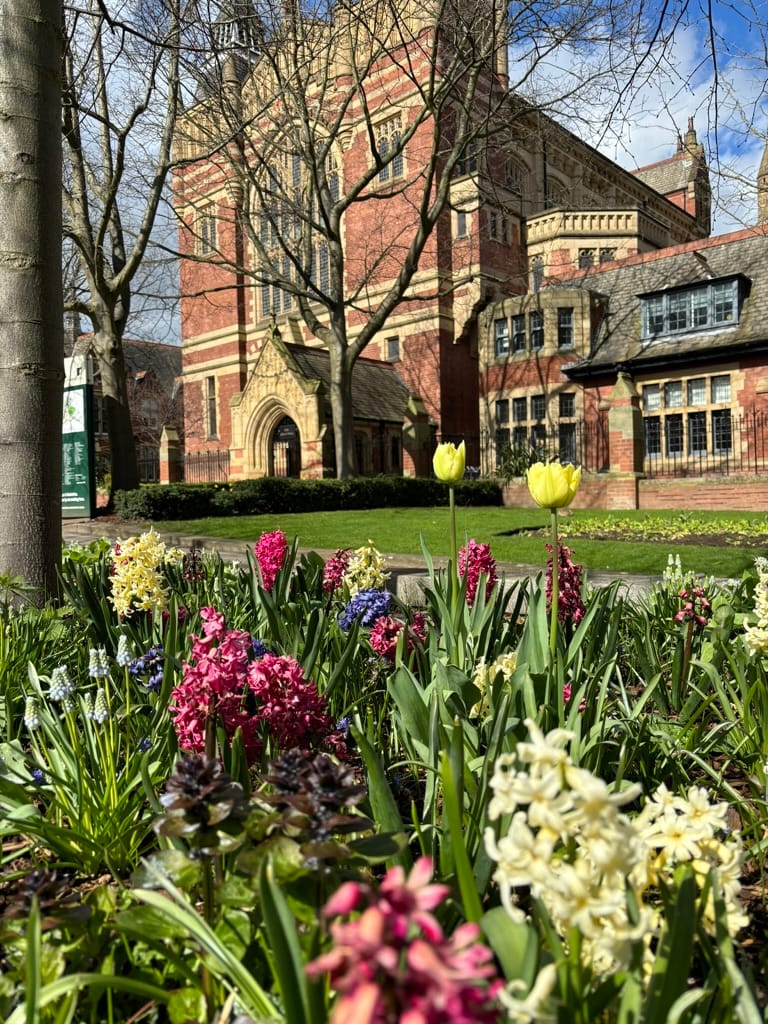
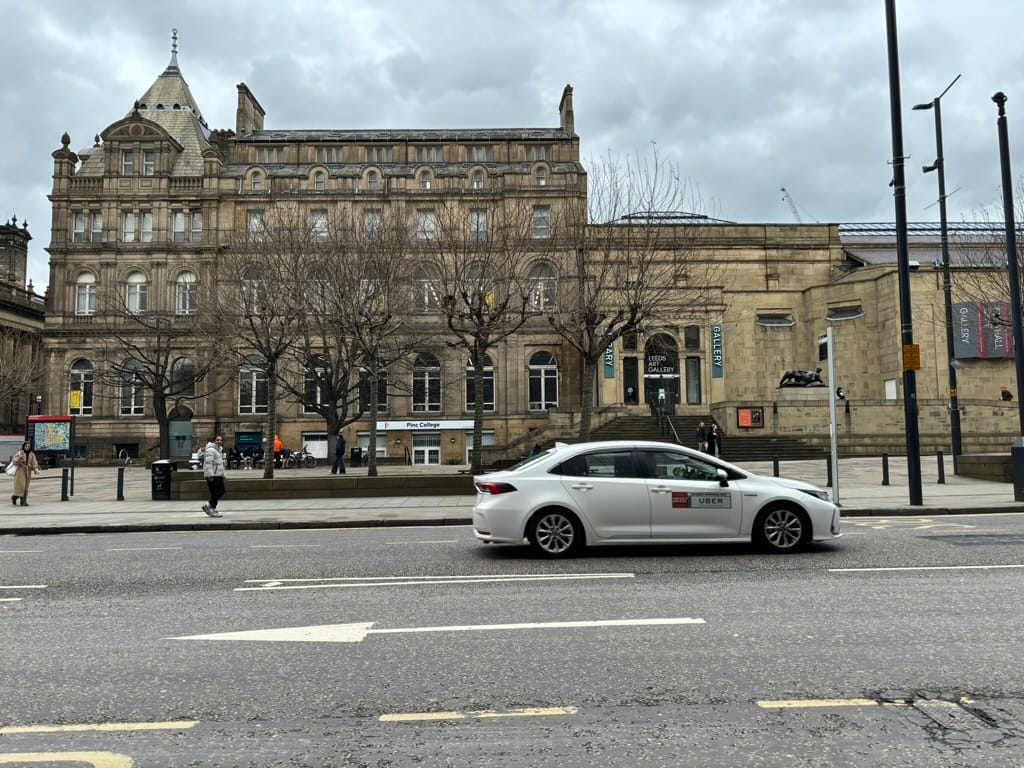
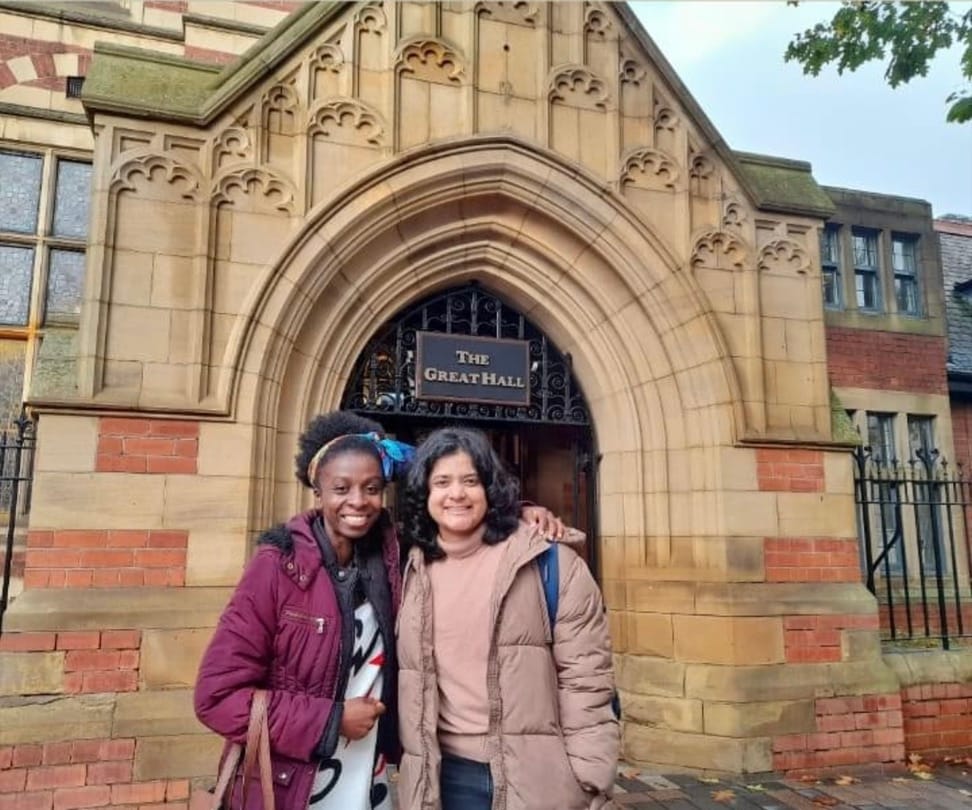
Second Year (2023-2024)
The second year was data collection.
I did: (1) Qualitative Content Analysis of Interview data (2) Discourse Analysis of Cover Decisions (which are the final negotiated texts at each COP).
My thesis needed expert interviews from UNFCCC COP negotiators, diplomats, UN officials and more. Sourcing elite interviews was a touch challenge. But what helped most was the professional networks and random snowballing technique(s). I was supported by the Priestley Centre for Climate Futures to attend the COP28 in UAE in November-December 2023, the UN Climate Conference in Bonn (SB60) in June 2024, and COP29 in Baku, Azerbaijan. I, therefore, attended these conferences as University of Leeds delegate and the University's UNFCCC Task Force Youth Rep (see here).
The analysis, and learning how to code using MAXQDA and NVivo (softwares) took most of the time. I had to keep refining the findings and analysis. The systematic mentorship of my supervisors throughout this process, and constant contact with them to brainstorm ideas, concepts and methods was highly providential.
I had immense joy in exploring the city more, making new friends and trying new cuisines, and building life-long friendships.
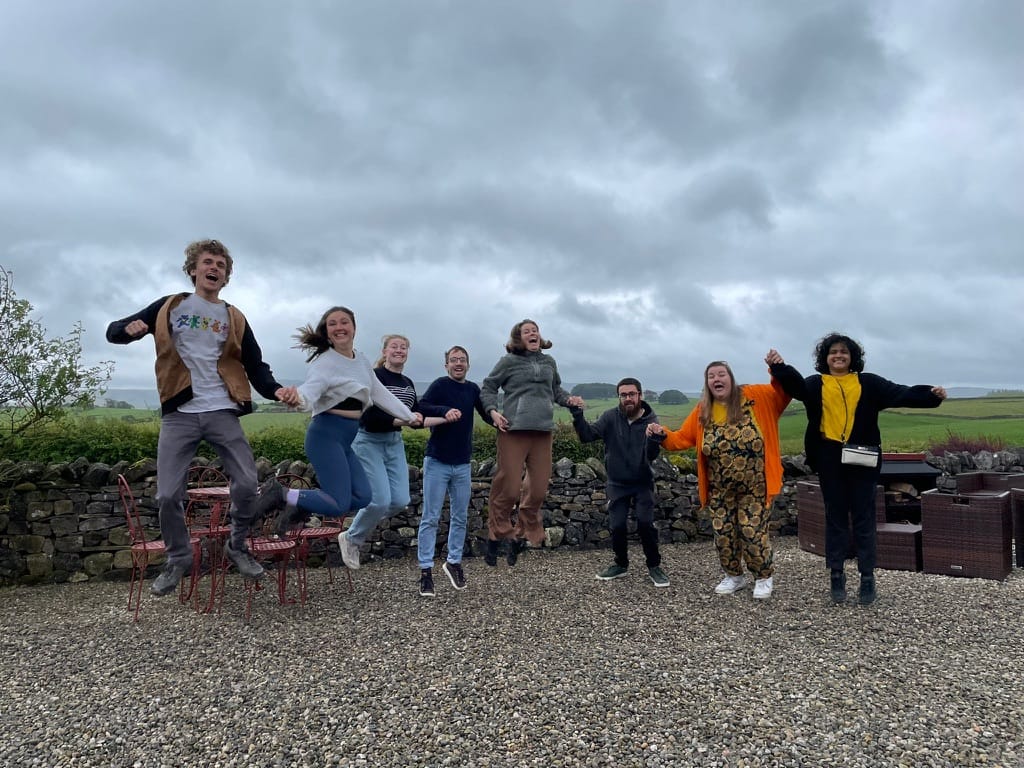
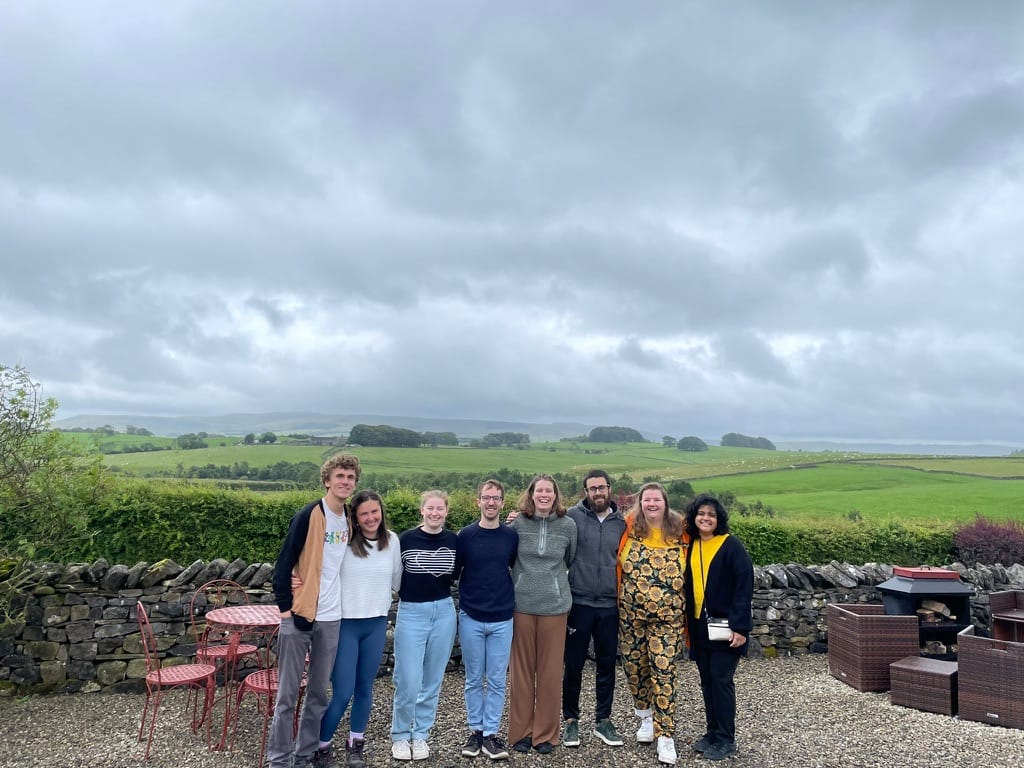
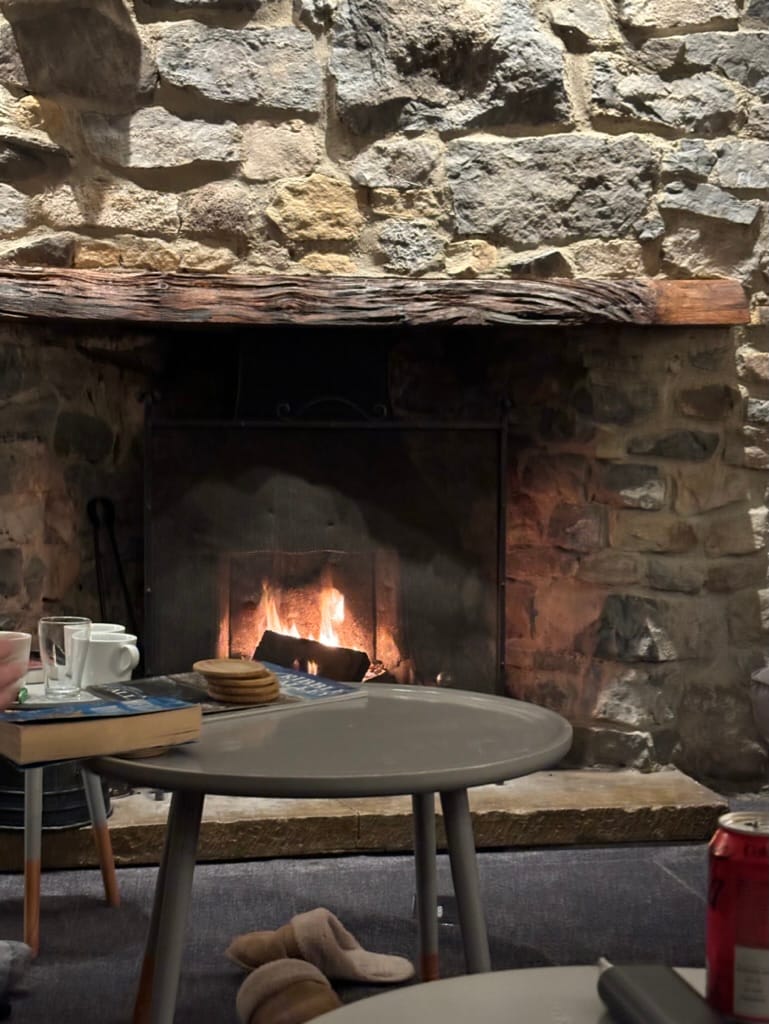
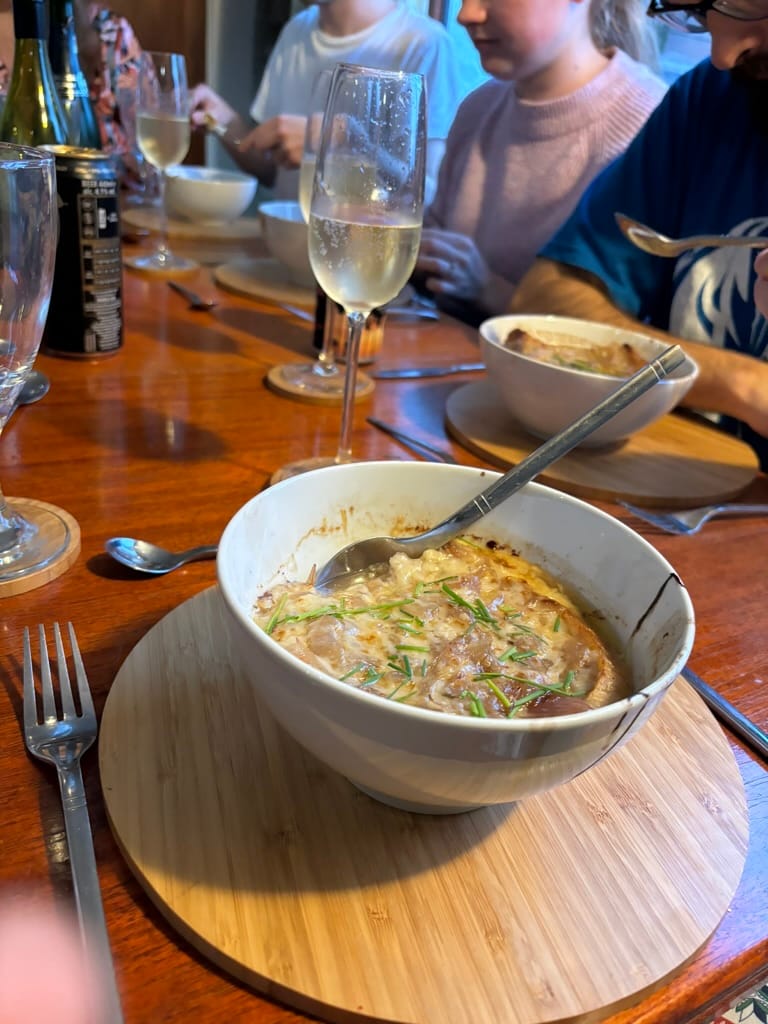
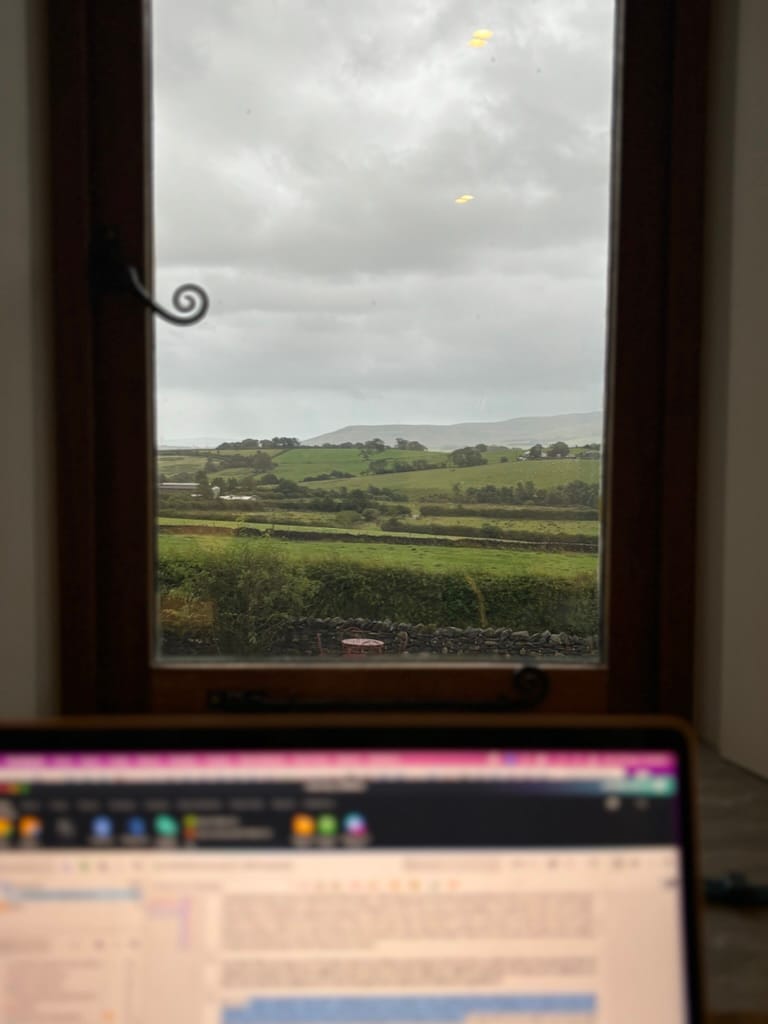
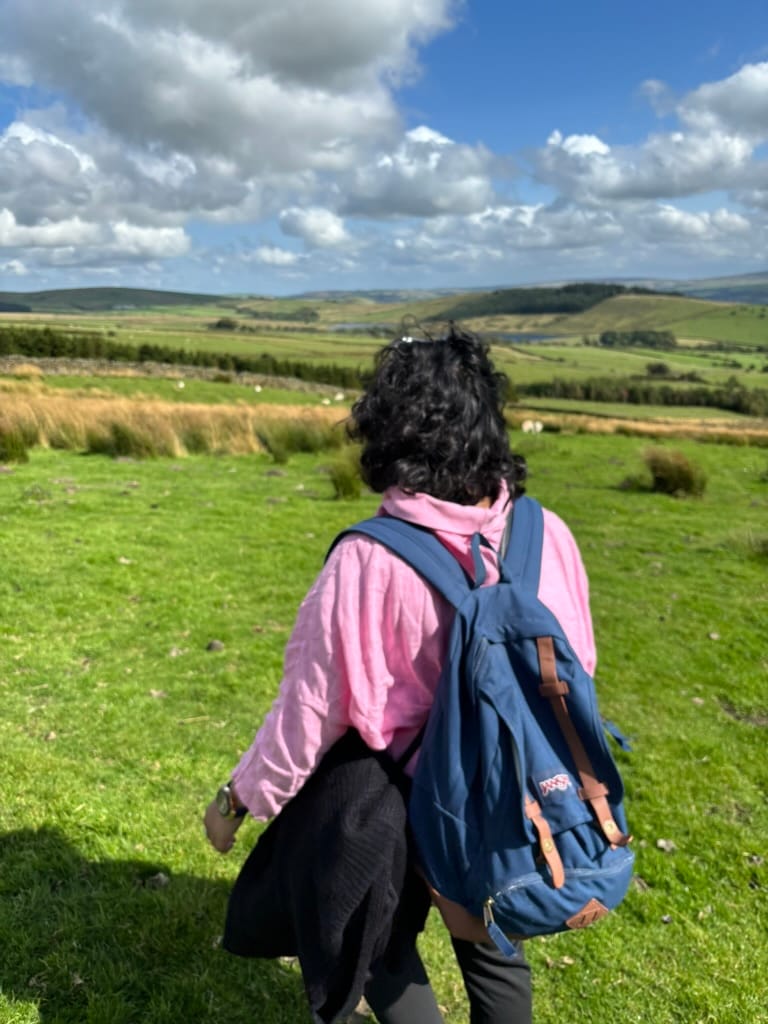
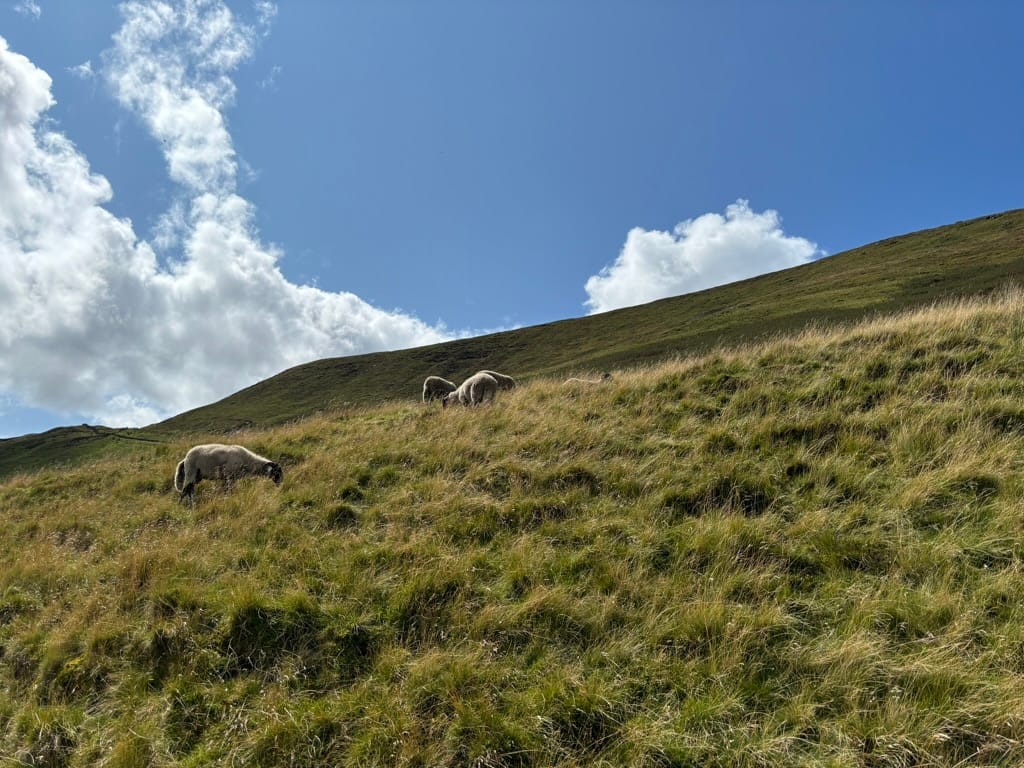
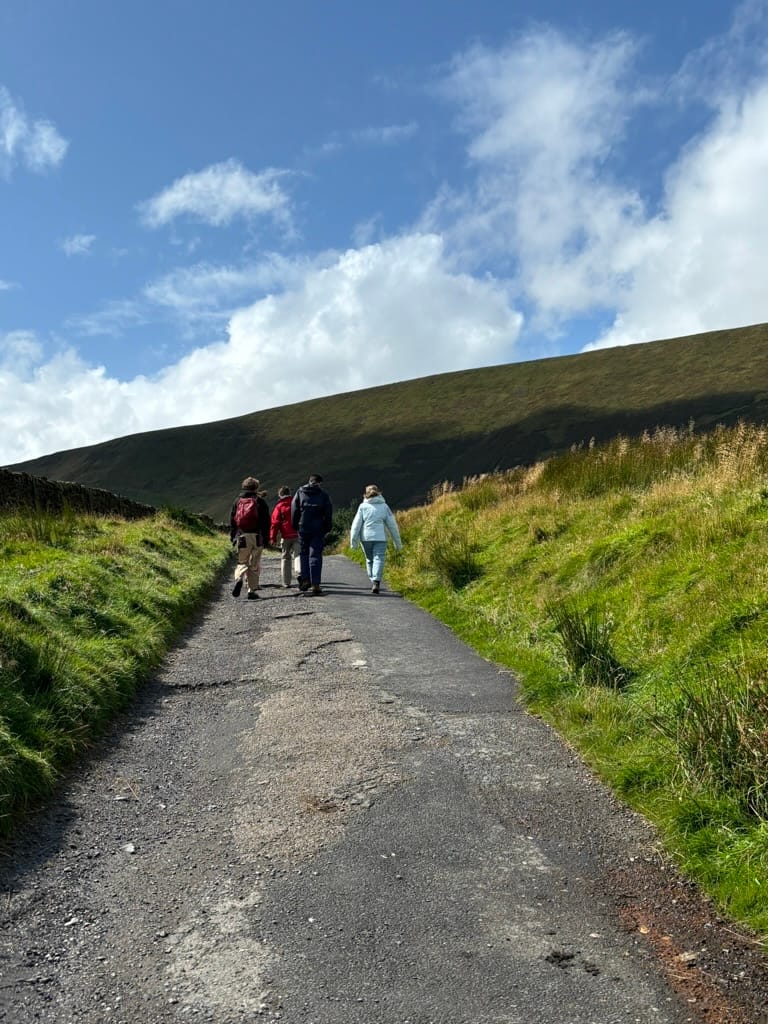
Friendships (beyond University) at Leeds :)
Friendships beyond Leeds were amazing too!! I had the lovely experience to reconnect with old friends, make new friends in the cities and countries I travelled.
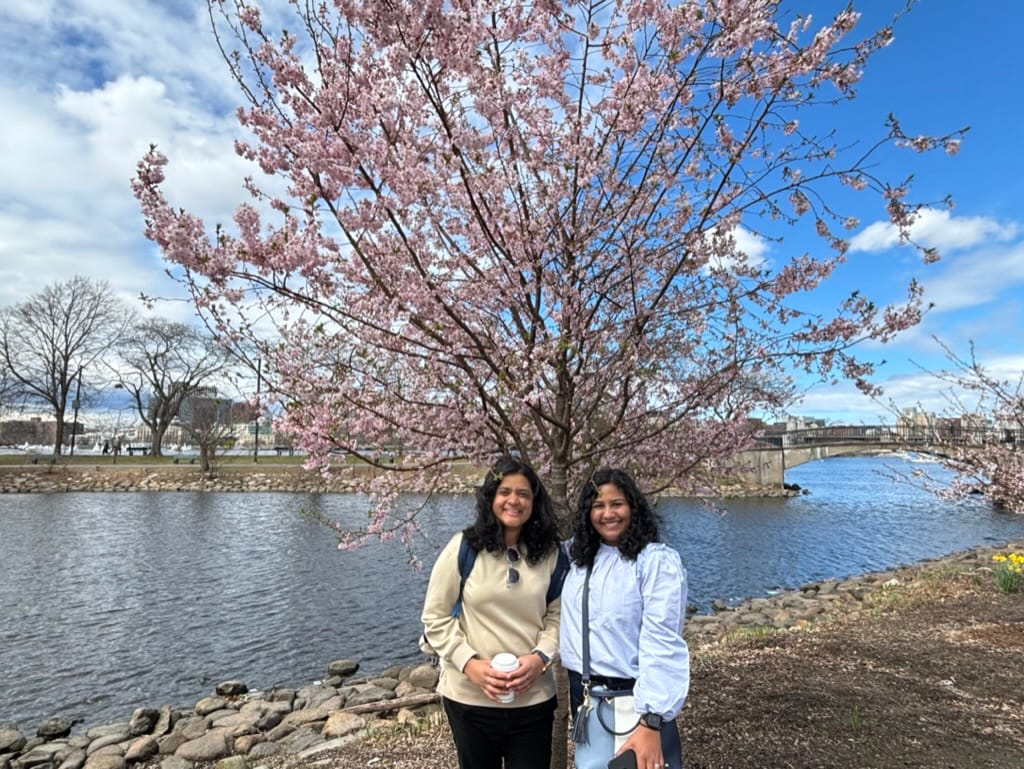
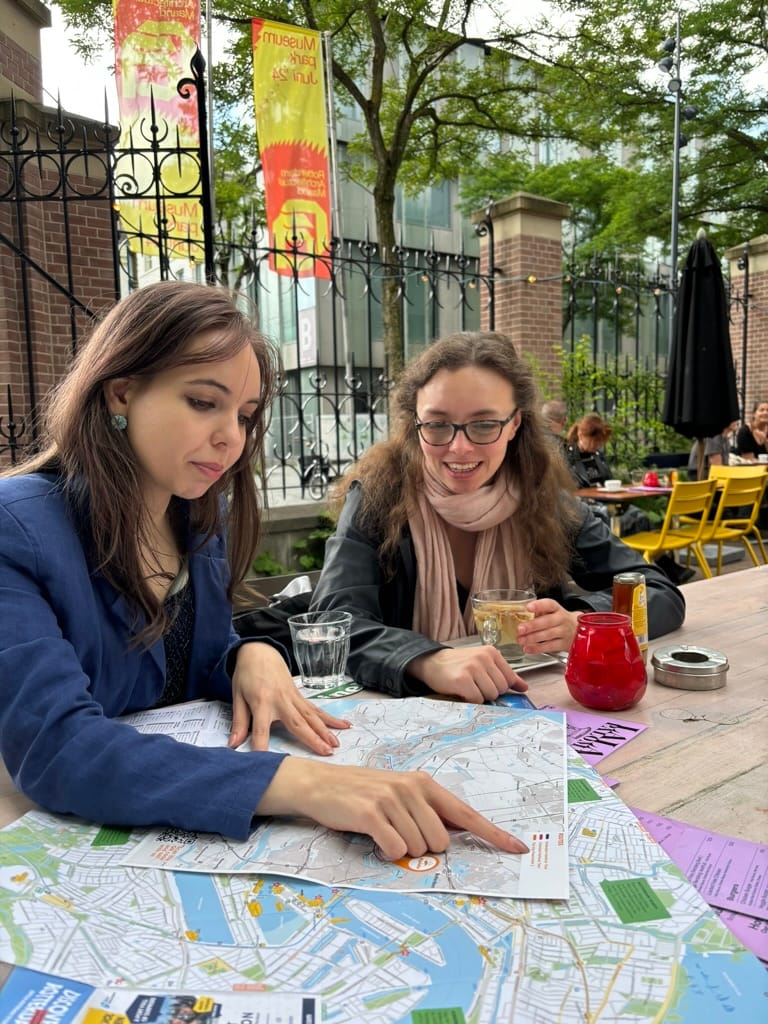
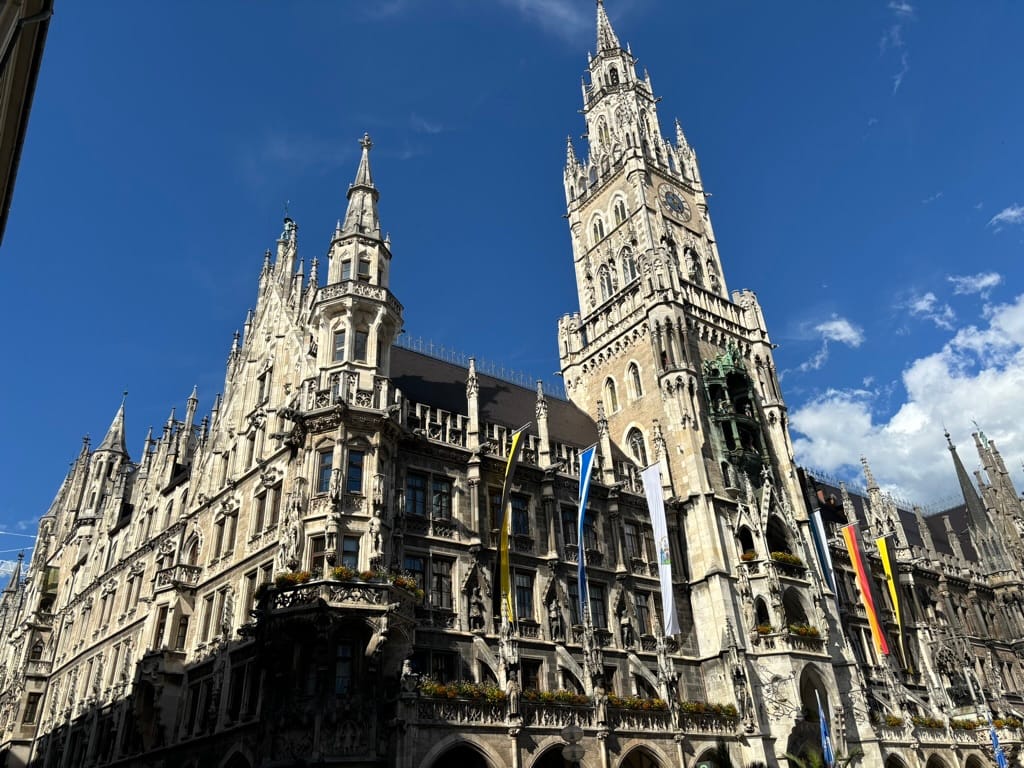
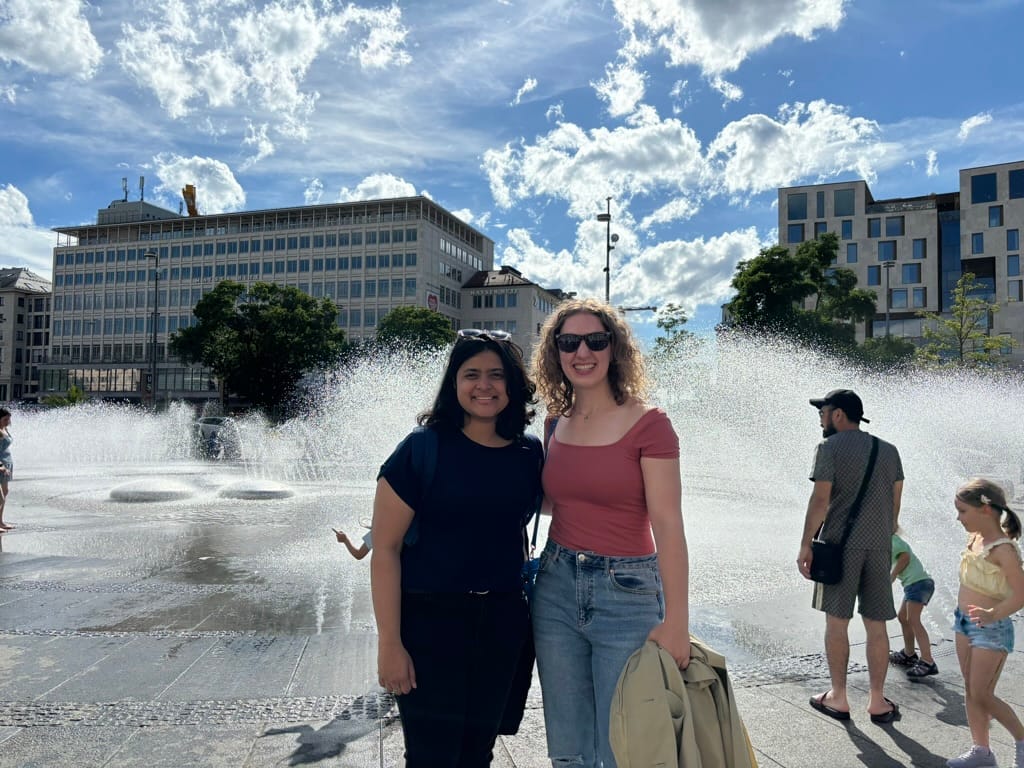
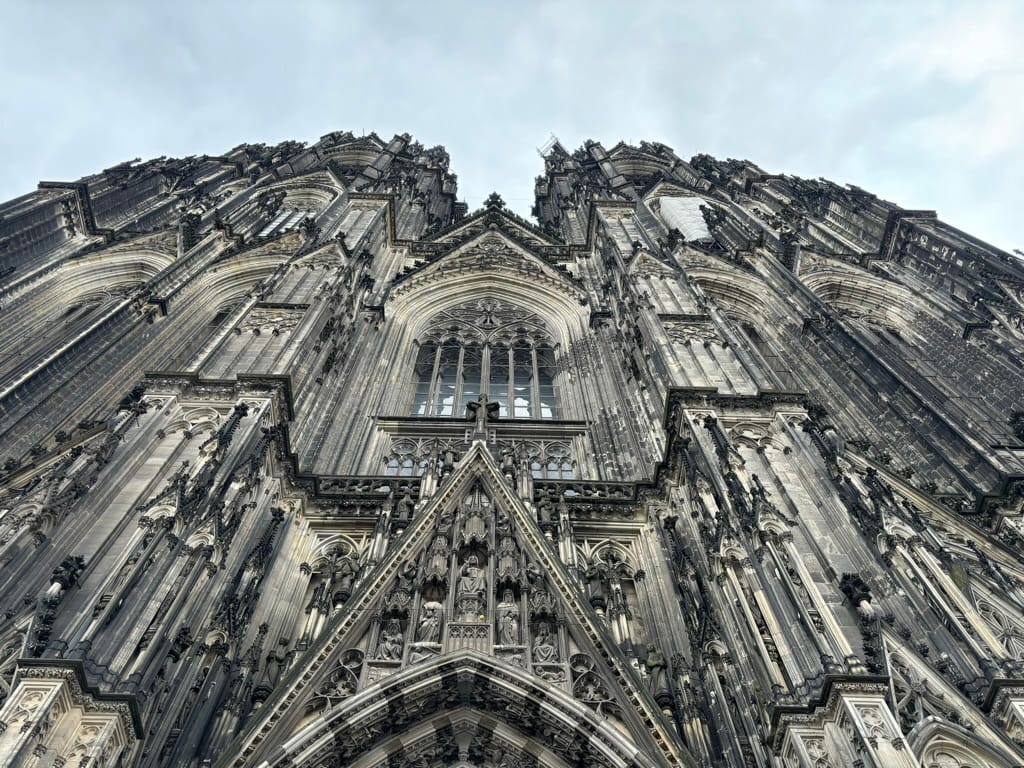
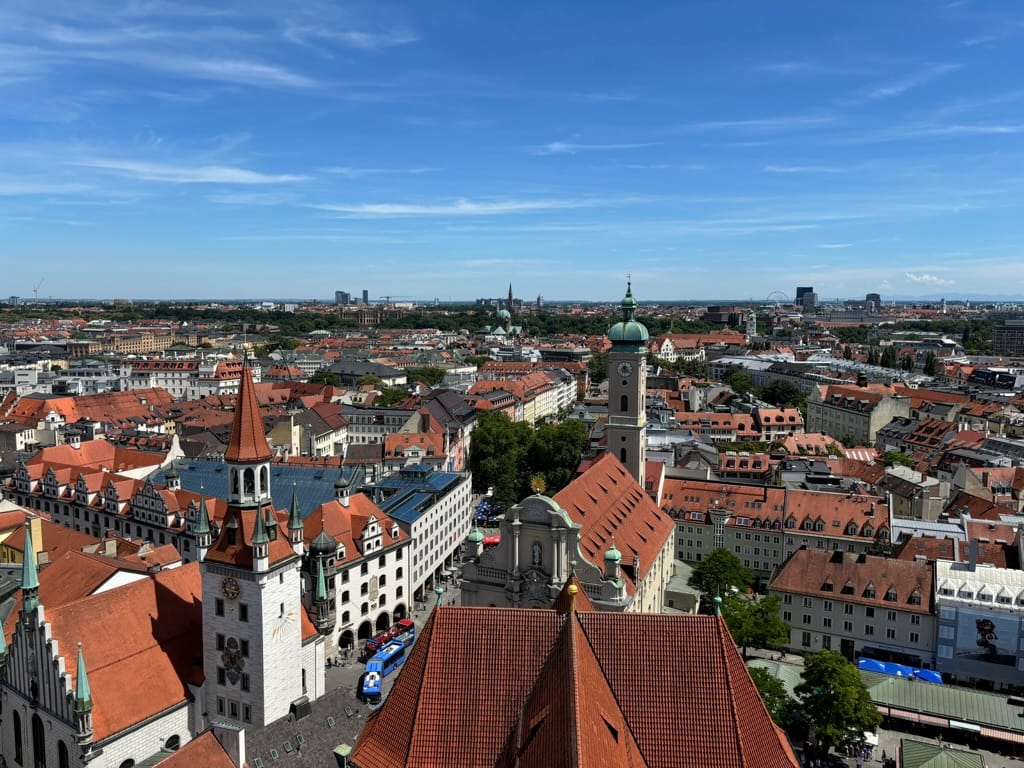
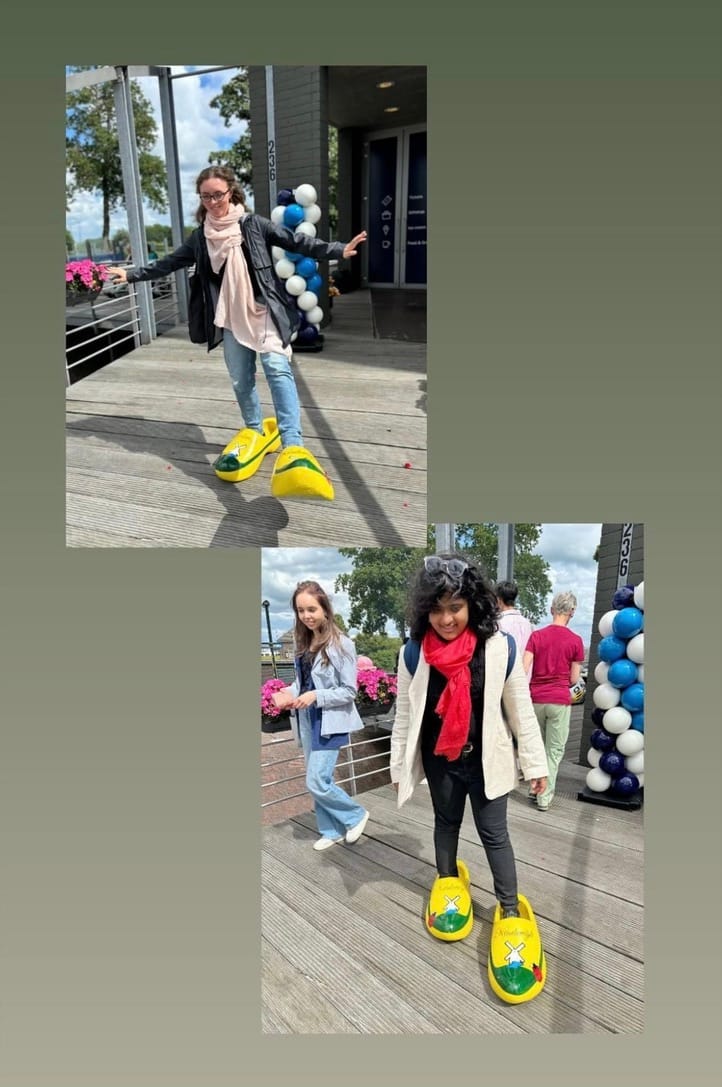
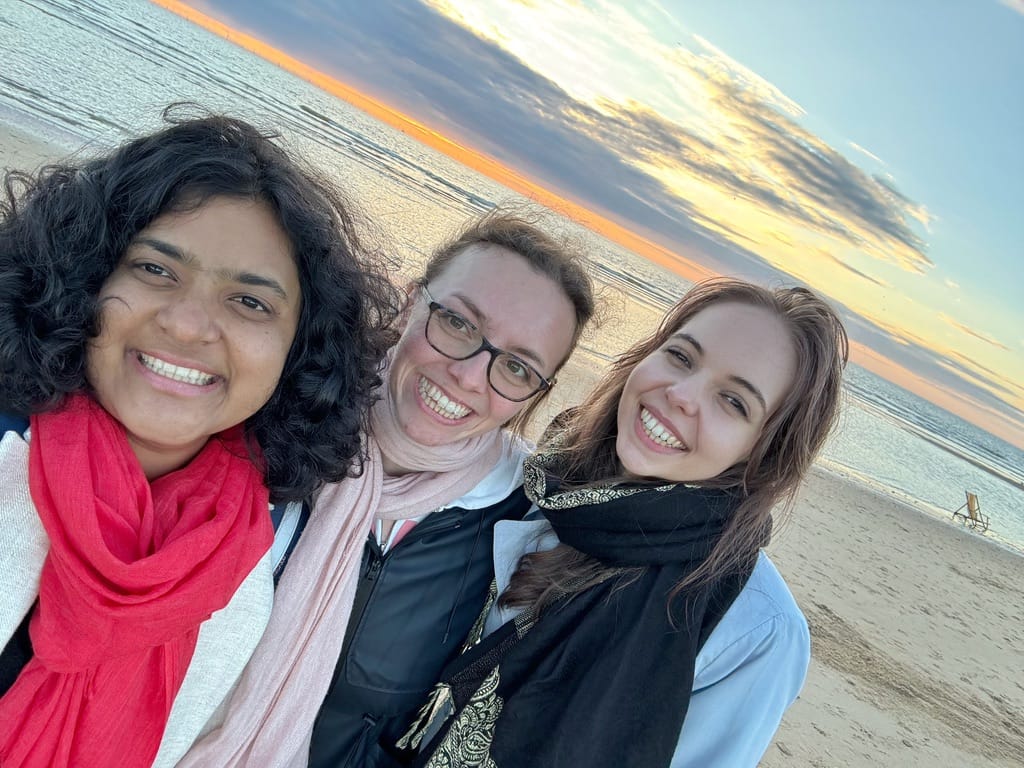
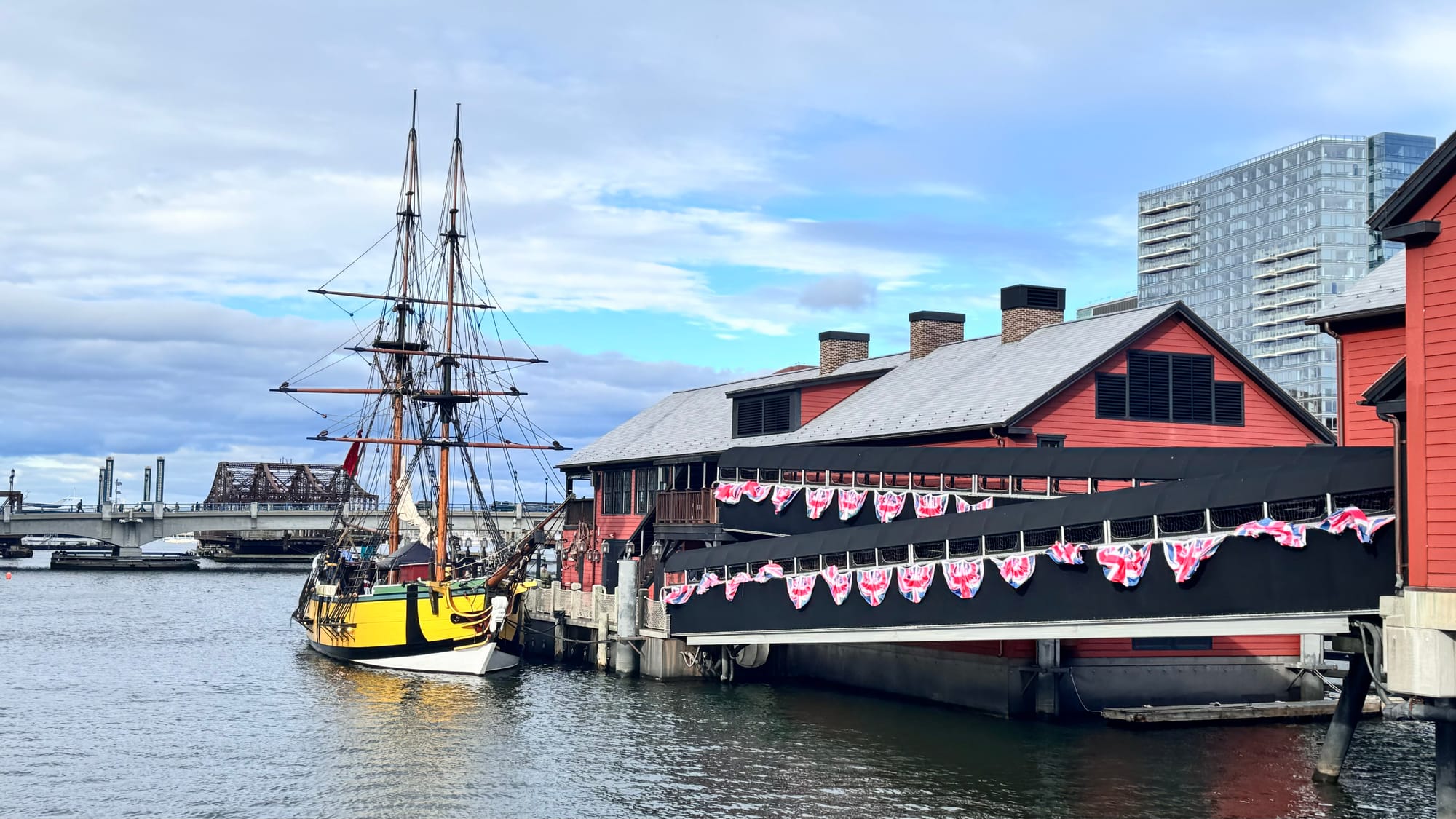
Places not in any particular order - are Europe and US
What I loved the most during this year, was testing my limits on slogging for professional advancement: writing, blogging, collaborating and innovating projects. What usually doesn't come out as research/career "output" are the hours of sleepless nights, days of not making sense of the articles/literature you try to digest, the awkward requests (emails) to experts or mutual friends in professional networks—to brainstorm ideas, and the amount of times you re-write a 1000 word piece to make sense of what you're wanting to express. Being hungry to learn more was key - and I found I need to be unapologetically me, in order to grow.
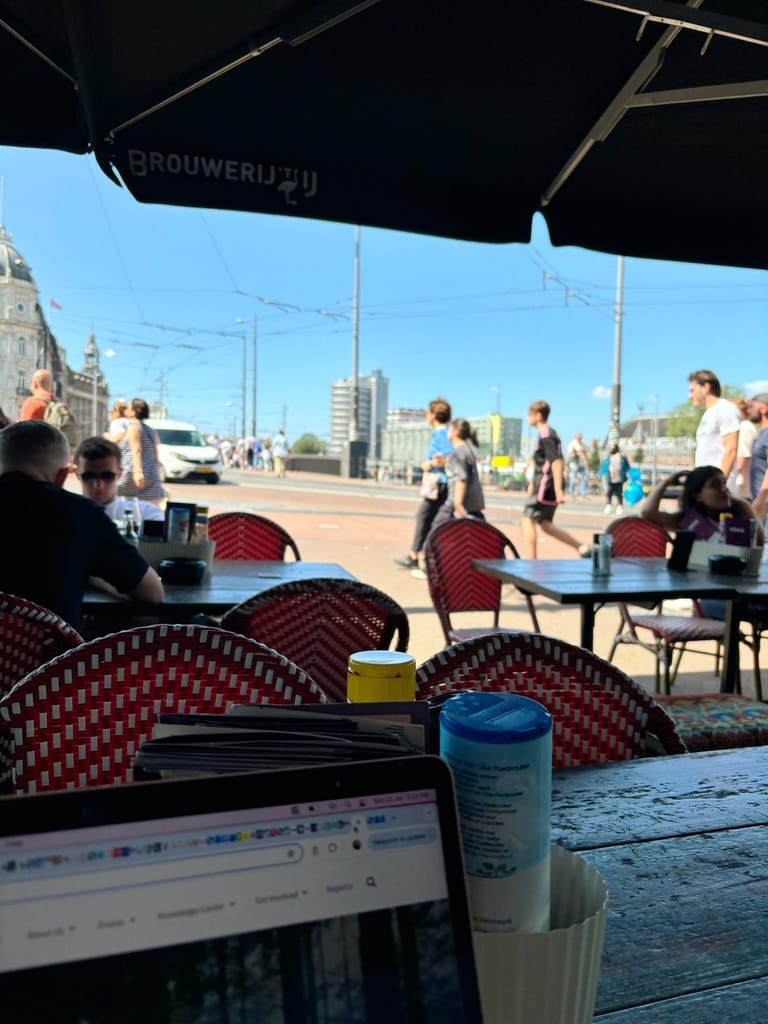
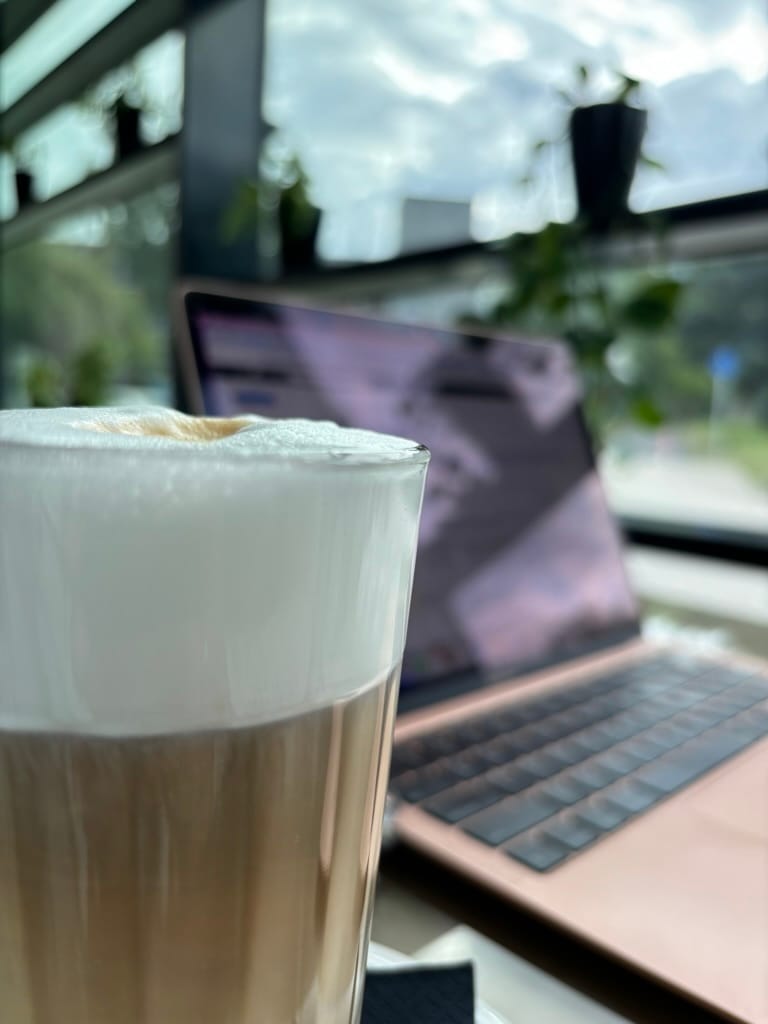
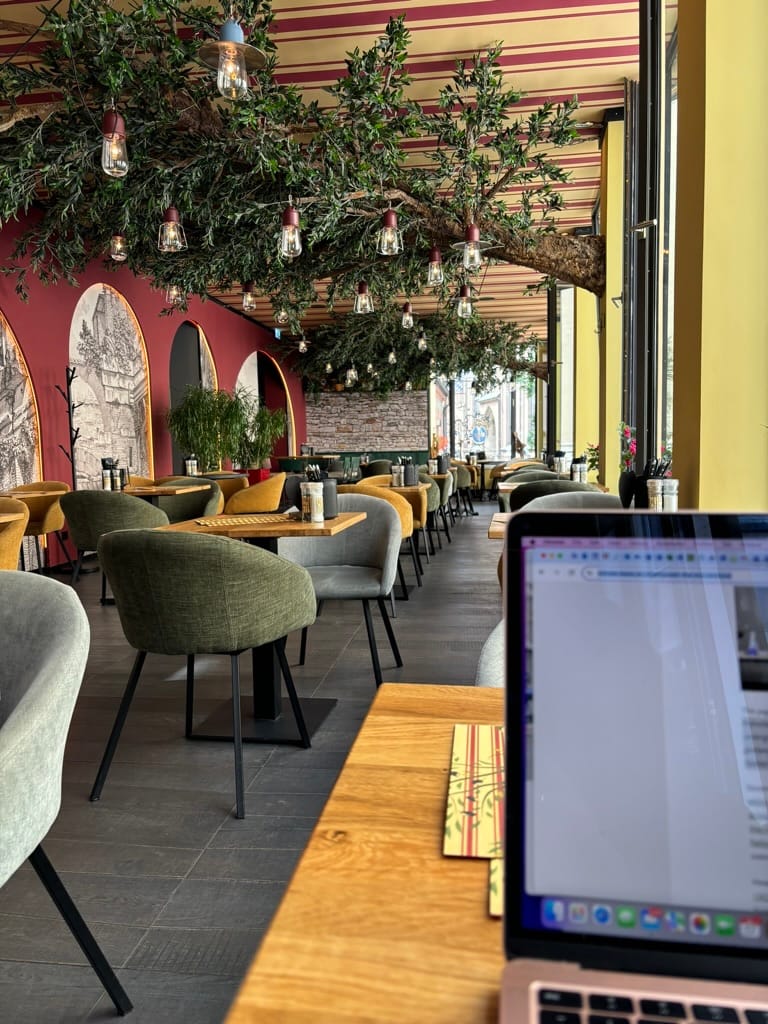
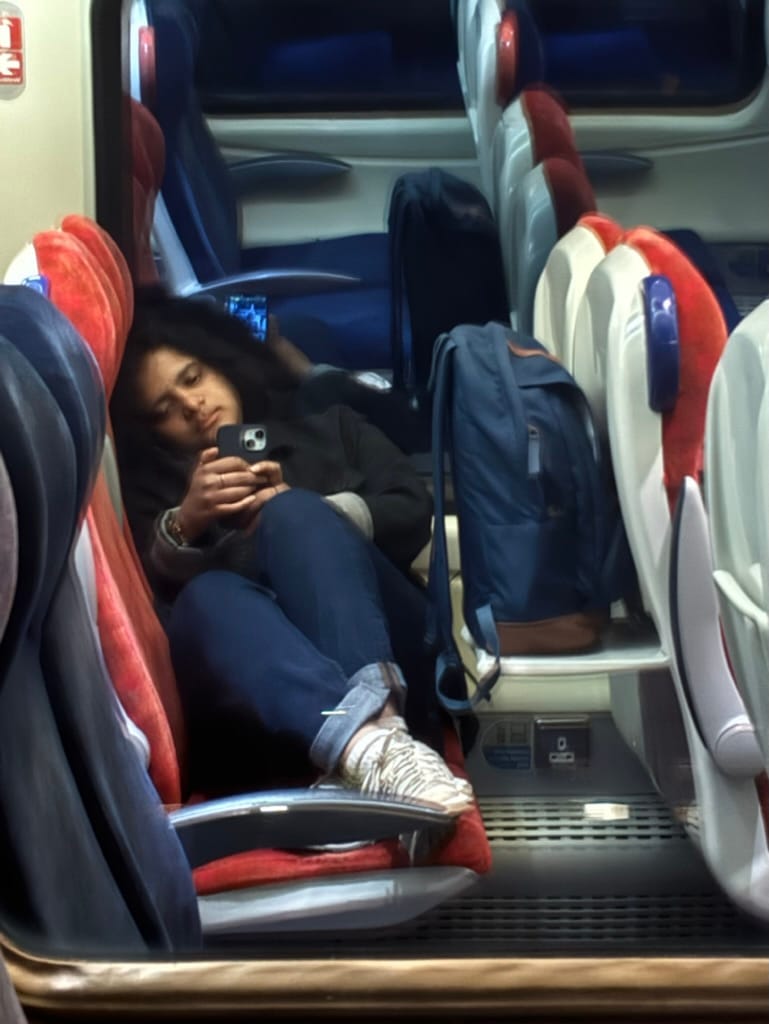
Working on PhD from Amsterdam (pic 1), Cologne (pic 2), Munich (pic 3); In UK - late night solo train journey (pic 4)
I am also deeply grateful to my family who checked on me always. We made time to pray nearly everyday as a family, no matter where we were. Dad and mom gave me the safest place to be me in all my rollercoasters <3 Simeon's (my elder brother) role in my PhD is also something I will never forget. He was always only just a call or message away for anything: whether it was to cry out (since I am a very private person; I never like showing emotions publicly), complain, crack jokes, clear my head on anything, and even to discuss ideas, new political trends, newspapers to read, and authors to keep track of. He was doing his Masters in Fletcher School of Law and Diplomacy and I've went to the US twice during this year - for conferences, where he was there to meet me wherever I'd be, and to cook good food for me, so that while I am with him, I am fully taken care of. This was privilege! <3
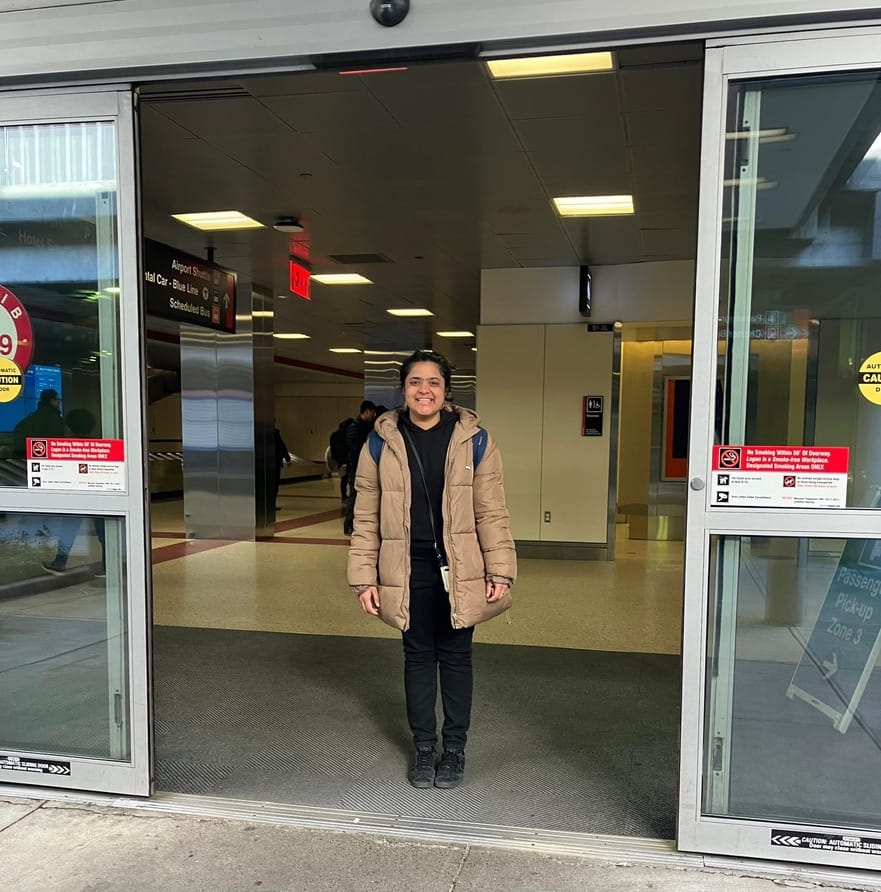
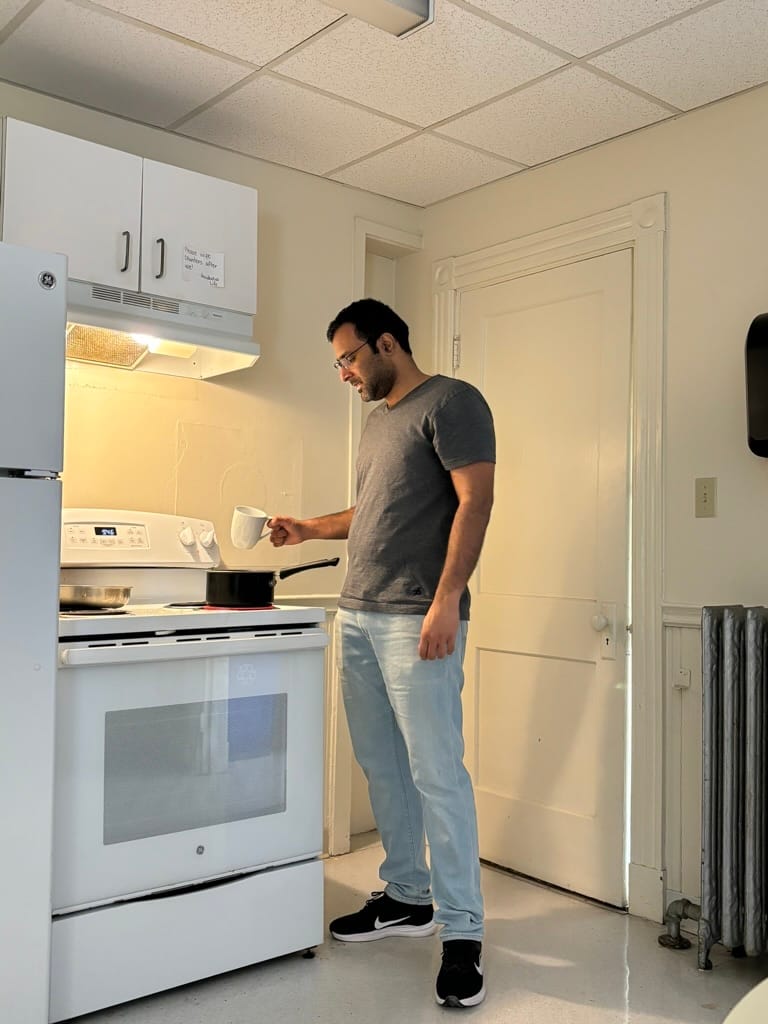
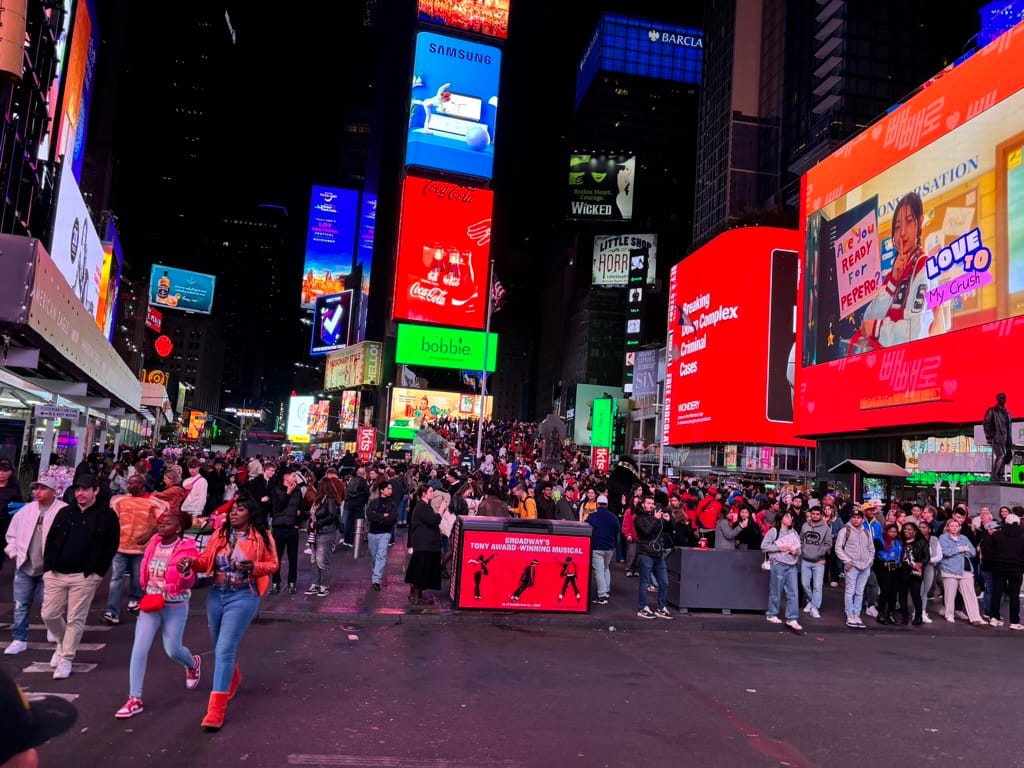
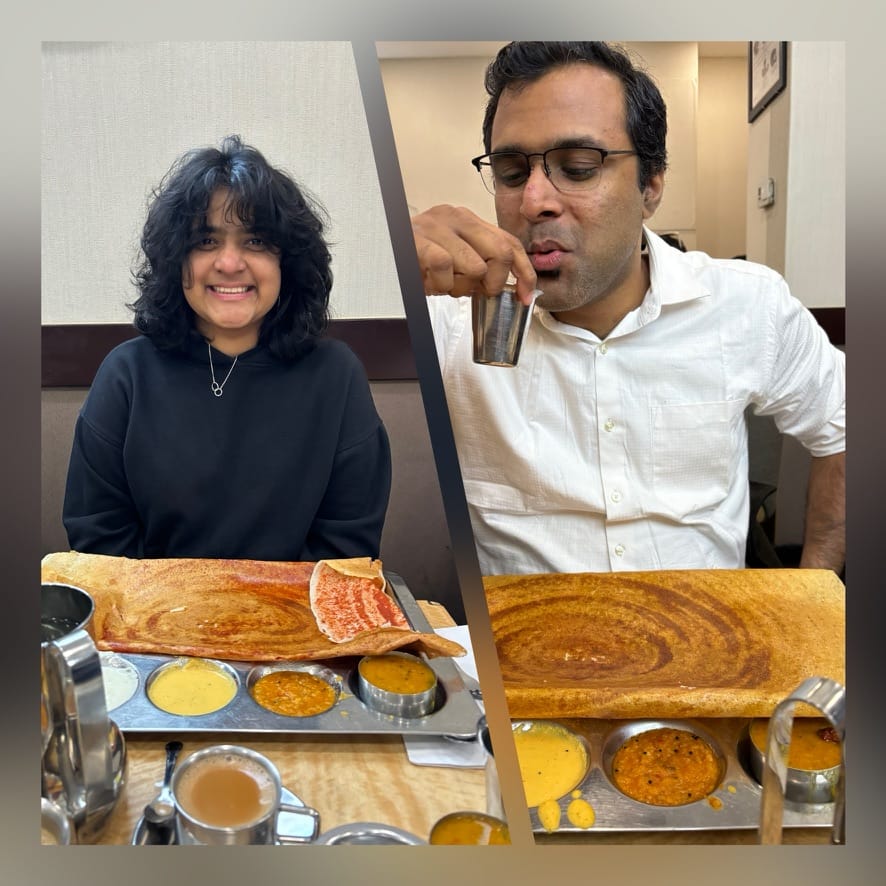
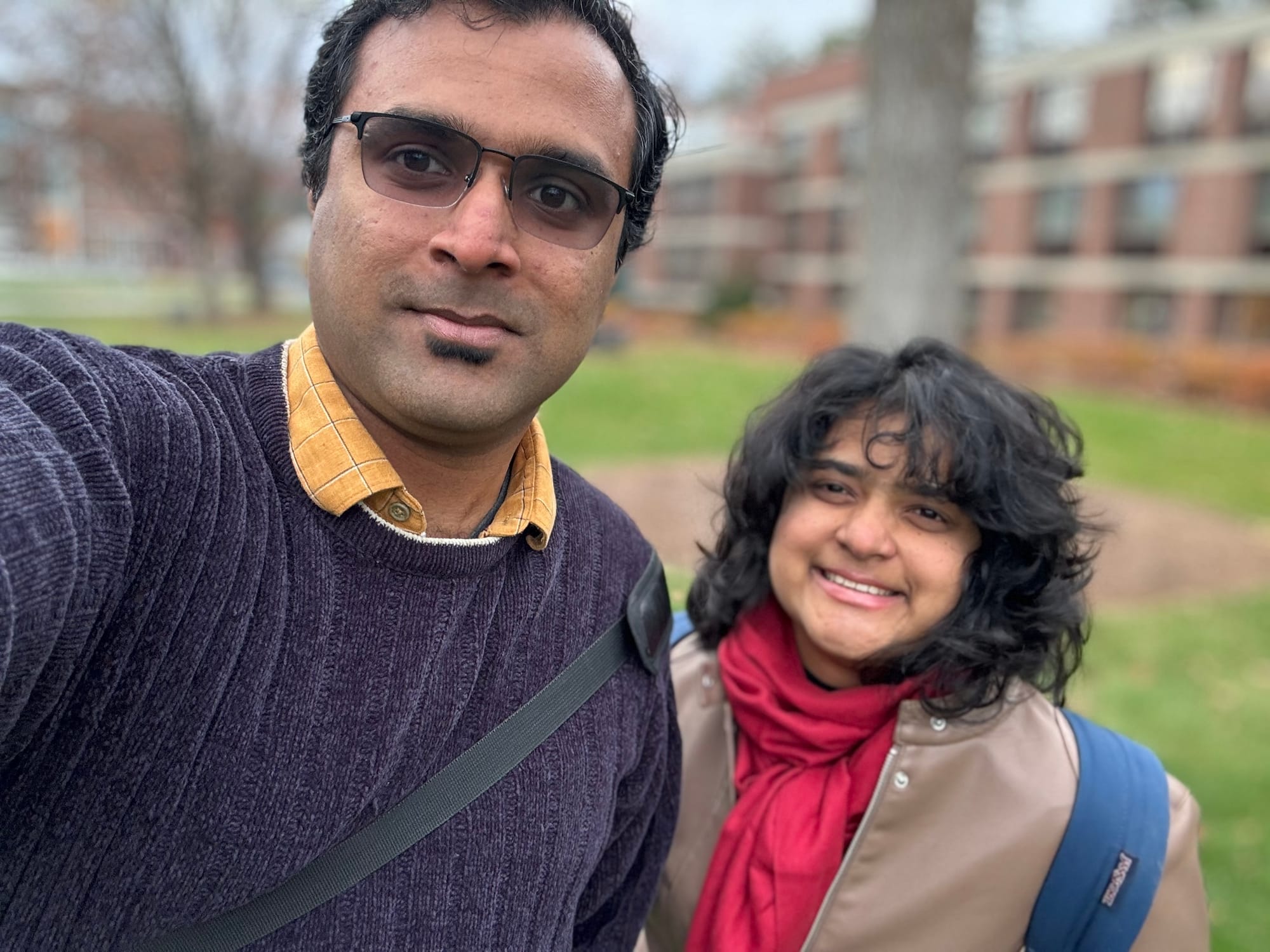
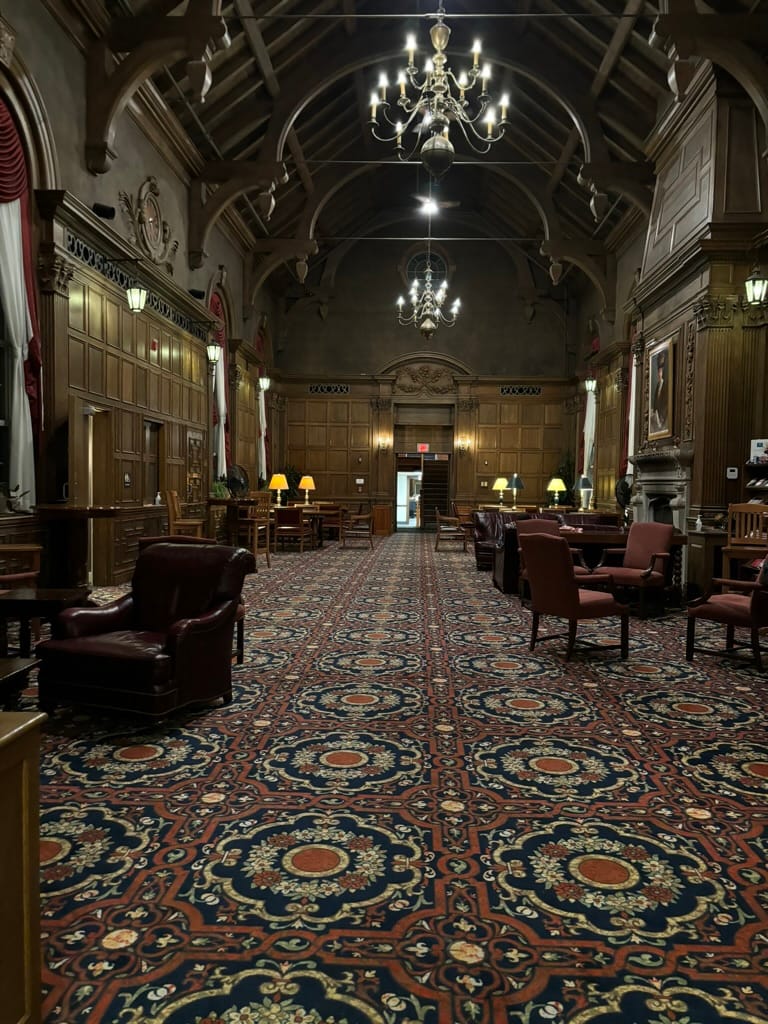
Simeon took this pic (the first pic) while I got out of Boston Airport. We were seeing each other after more than a year or two. The other pics were when we visited New York and Dartmouth.
Third (Final) Year (2024-2025)
The final year was more about how to wrap up. This meant - collating thoughts, grappling with different concepts, giving more authenticity and depth to my analyses, and finally writing up.
Writing up was far tougher than I anticipated.
Final year is a tightrope. My personal experience was that, this year was when I needed utmost balance - not power, nor hunger to learn more (unlike first two years). It's a time where knowledge settles down and translates to paper - so channelling every energy to maximise the clarity of the output, was the most important part.
Further, final year in doctoral studies is not just about intellectual rigour, but about discipline, self care, downtime, and doing small things (for me, I did things like colouring, going for walks, seeing movies, listening to music, journalling, and immersing in nature) where you intentionally take time to feel the colours, the sounds, the birds chirping, the leaves moving, and being present. Not dismissing any overwhelming thoughts, but meeting emotionally vulnerable moments with prayer and presence. It's not easy.
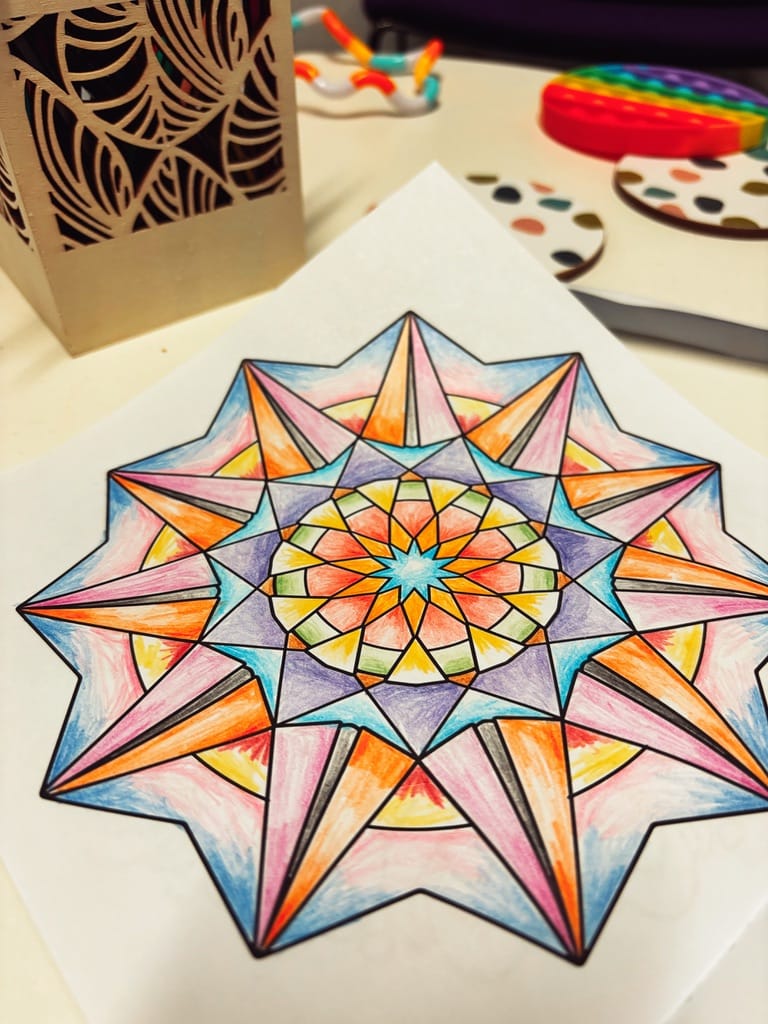
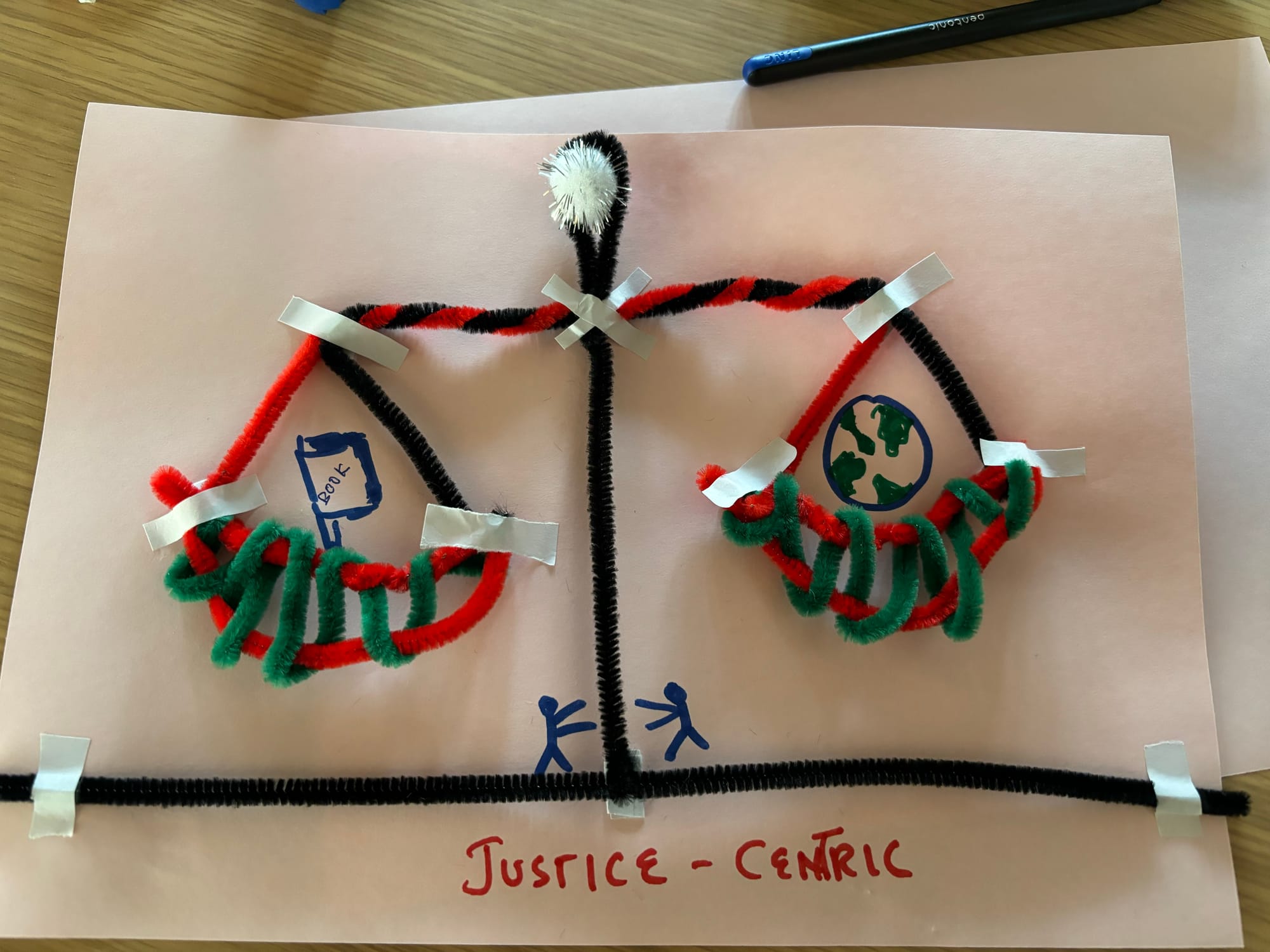
Mentors help. So, another fact that I understood through this journey is that talking to those who have journeyed this phase before is good. I have had amazingly kind mentors along the way - who never have once judged me for writing to them asking questions, emailing them asking for specific instructions while at crossroads, or scheduling short e-meetings to discuss important things (but being very carefully not to swamp them; since they'd be juggling even more than what you imagine).
Peers help. I also found out, this was a phase where naturally you feel like isolating yourself from everyone and everything; but limited and regulated social interaction is extremely helpful. Saying no and putting boundaries will define the clarity of thoughts. I've enjoyed spending time in the POLIS PhD suite - just because, once in a while, when I see my friends - we exchange smiles or frowns that communicate volumes. I've also found it empowering to learn that 90% of our challenges and struggles were similar - and just talking it over a coffee or having lunch together makes us understand that none of us are stuck in a maze too.
After writing my first full draft - I was physically tired to even get up for more than a week. I later understood this was natural. Adrenal fatigue can happen; but knowing that it can and that's okay makes you far less vulnerable and open to build yourself up again cheerfully 🙂
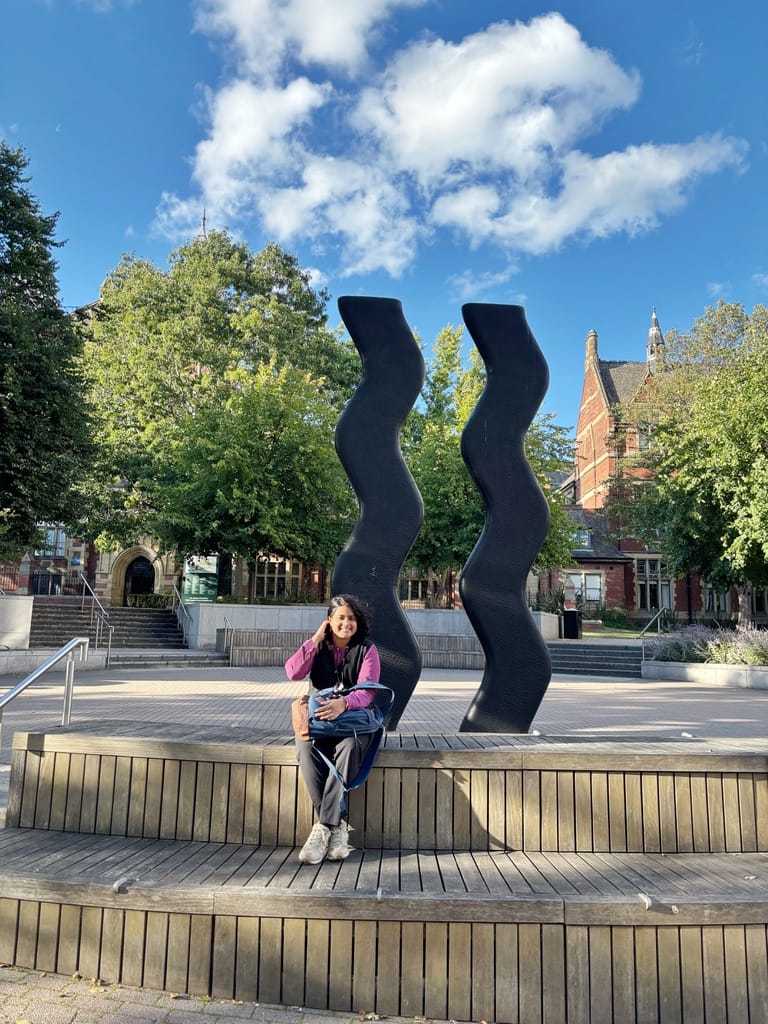
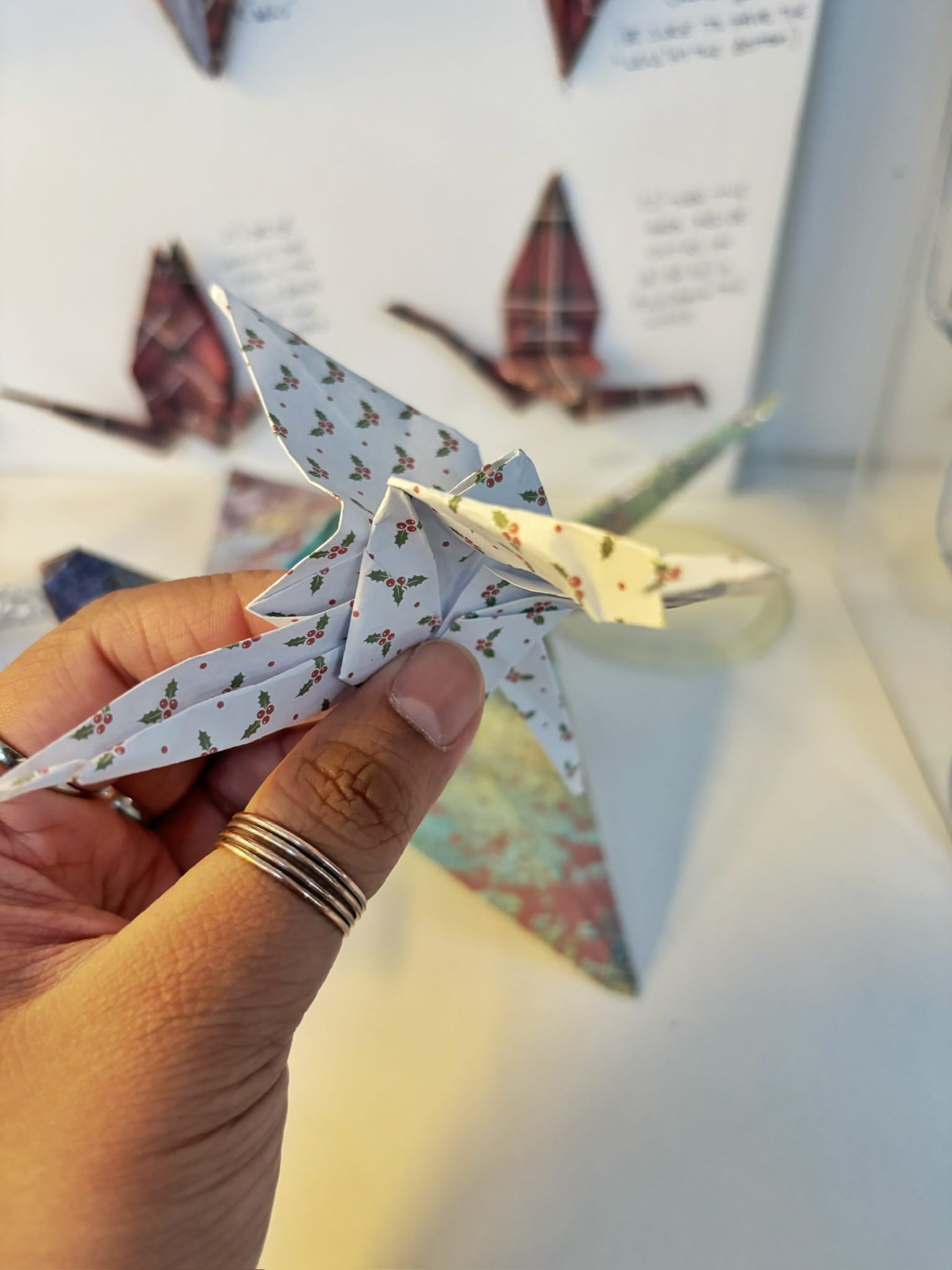
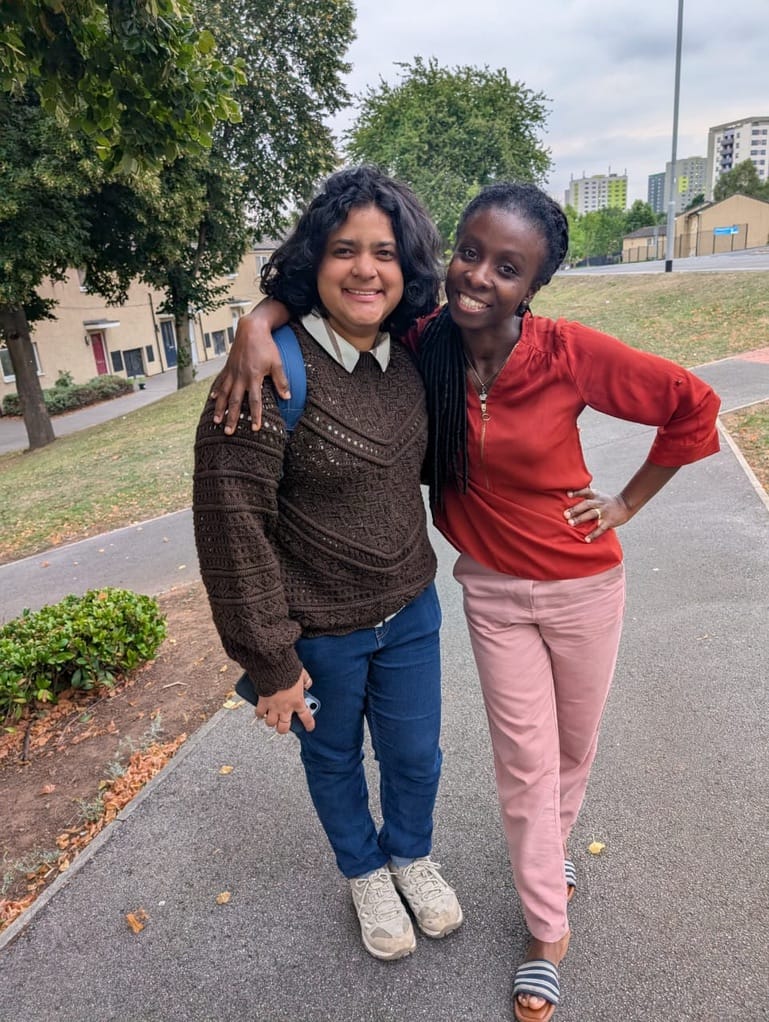
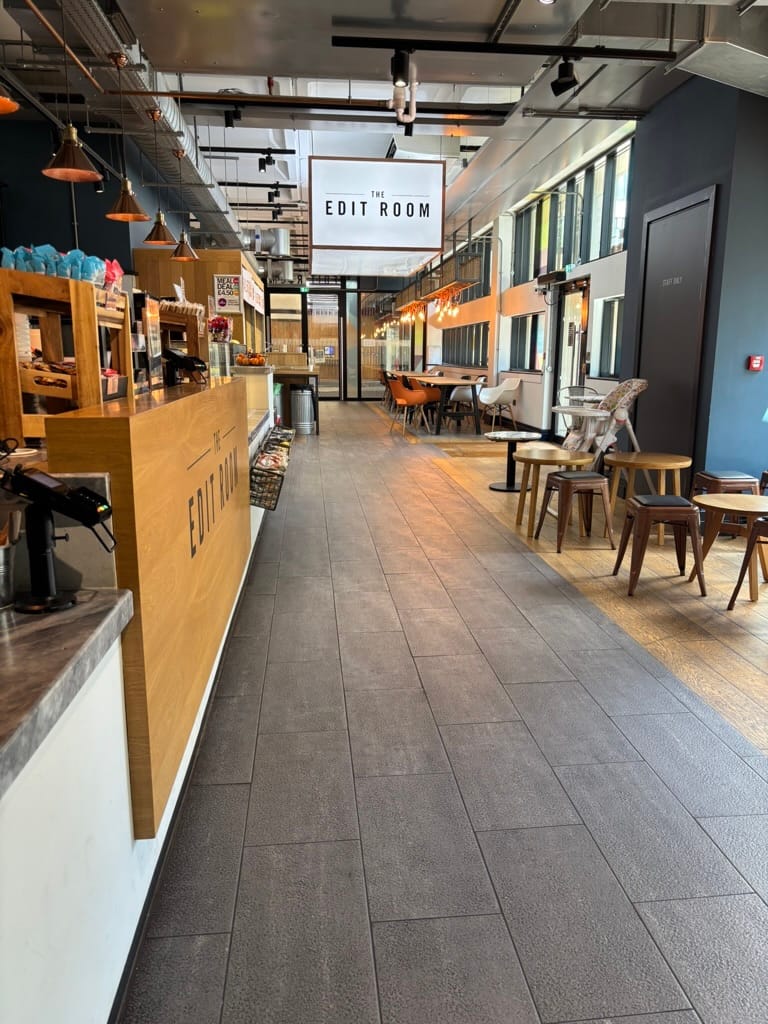
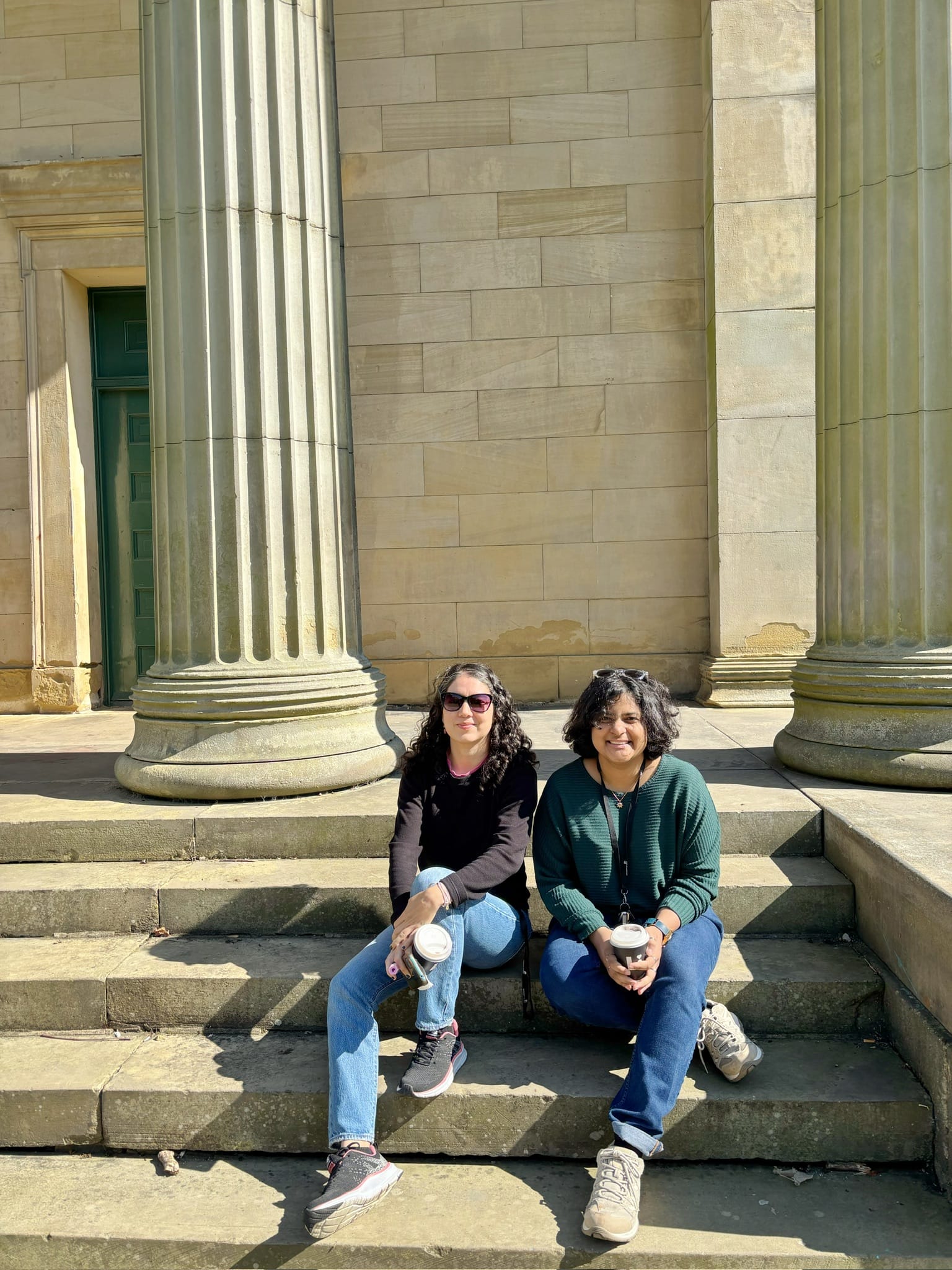
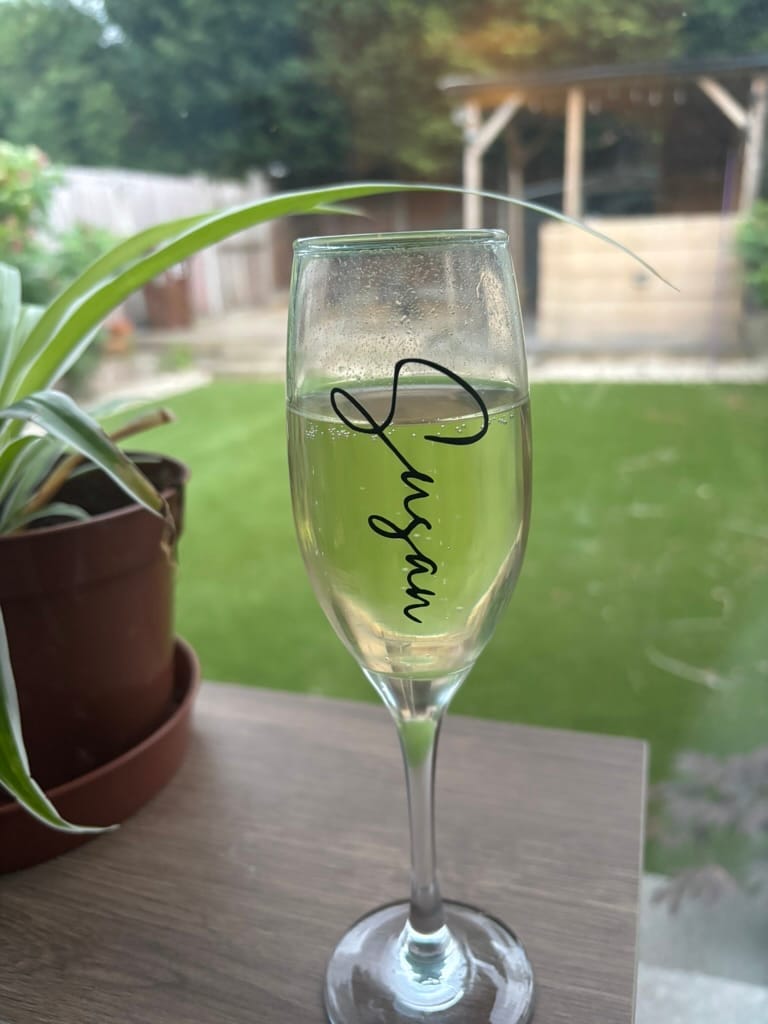
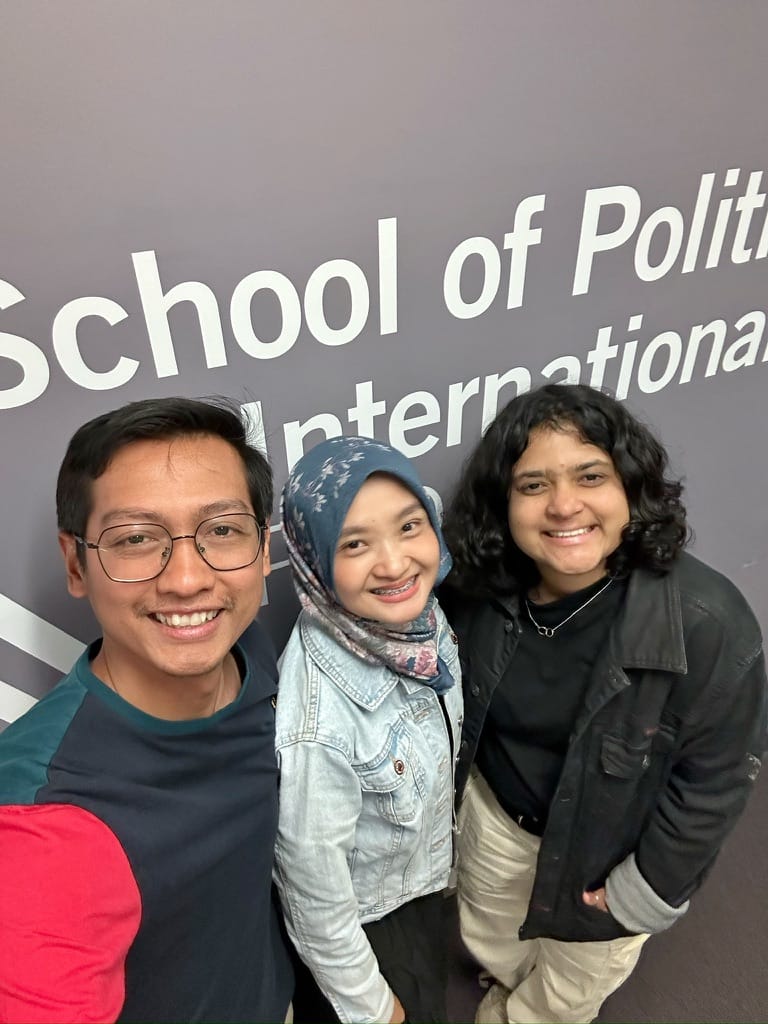
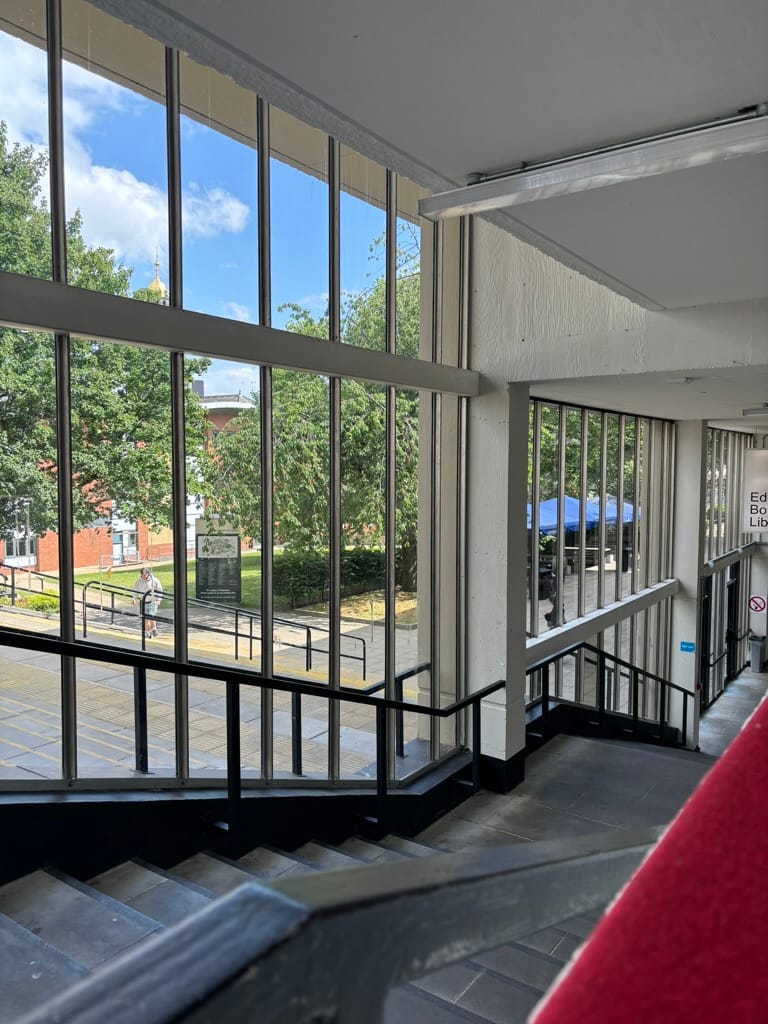
In Leeds with friends, and solo walks.
Submission of Thesis and Defence
This phase was remarkably unique... personally, it was a phase of much learning, exploring and becoming. On 29th August 2025, I relocated back to India. Packing my bags and following a calling to go to the "known" (i.e., my hometown) was scarier to me than pursuing the "unknown" (i.e., everything that excites me beyond India). I've felt the most unsettled during the months of April - November 2025, mainly because I was battling a lot of emotions: of identity, belonging, career, life, purpose etc etc. I knew my PhD funding finishes on September: this accelerated everything. I didn't have money to make choices at an un-rushed pace — so I rocket-fuelled myself (and I believe, this has been a blessing in disguise!).
On hearing my vision for India and enthusiasm to learn ground politics, Dr. Shashi Tharoor, invited me to take up a role in his office. On 3rd May 2025 when I met him and his team, we discussed on how best to situate me in the office. I did a two-week internship in Thiruvananthapuram, to get to understand the local realities. Thus coming back home in August 2025, had a commitment and excitement - which I am still processing. I told the team that I was finishing up my thesis, and hence needed a month (the whole of September) to process the last bit of my PhD.
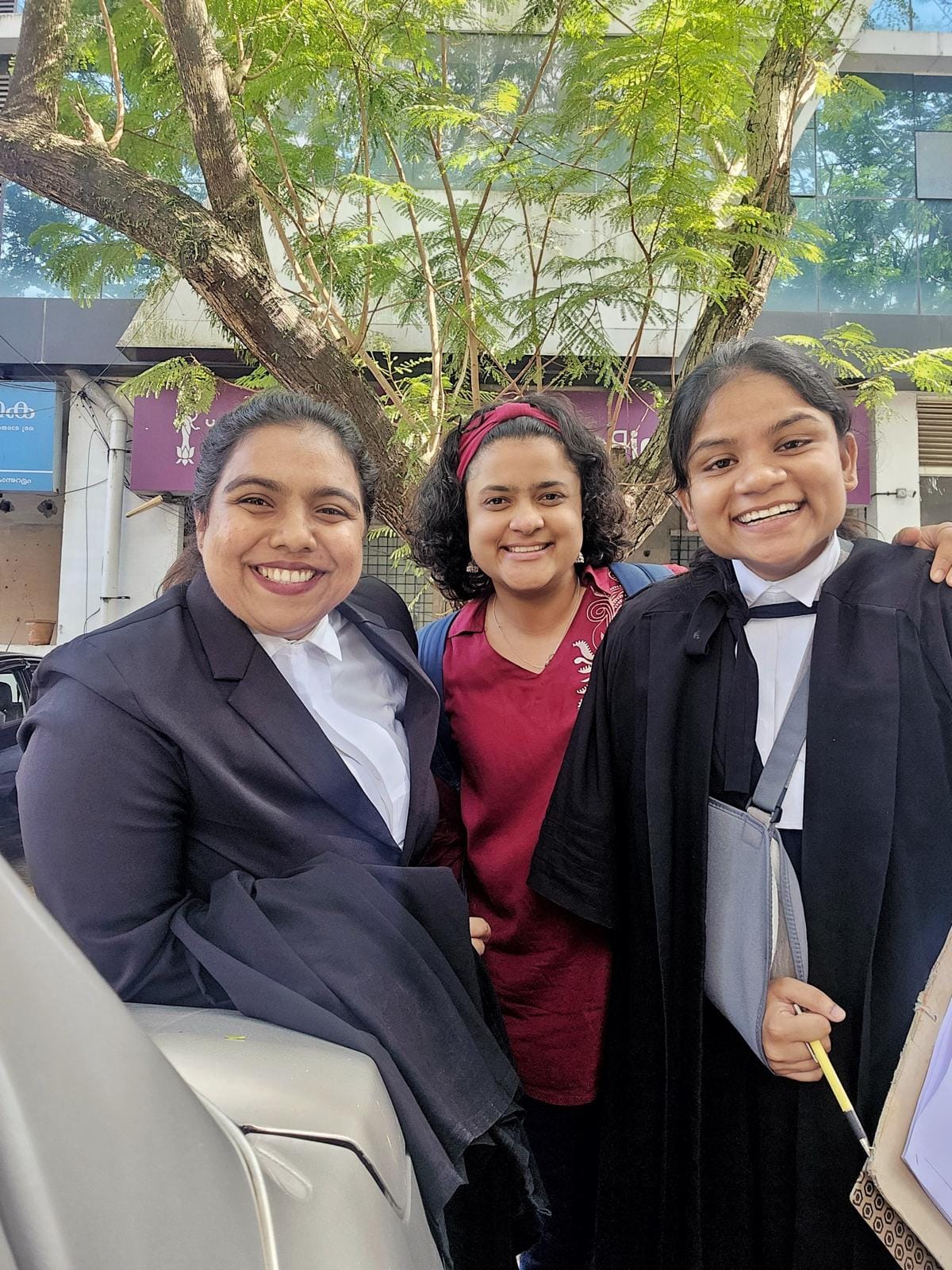
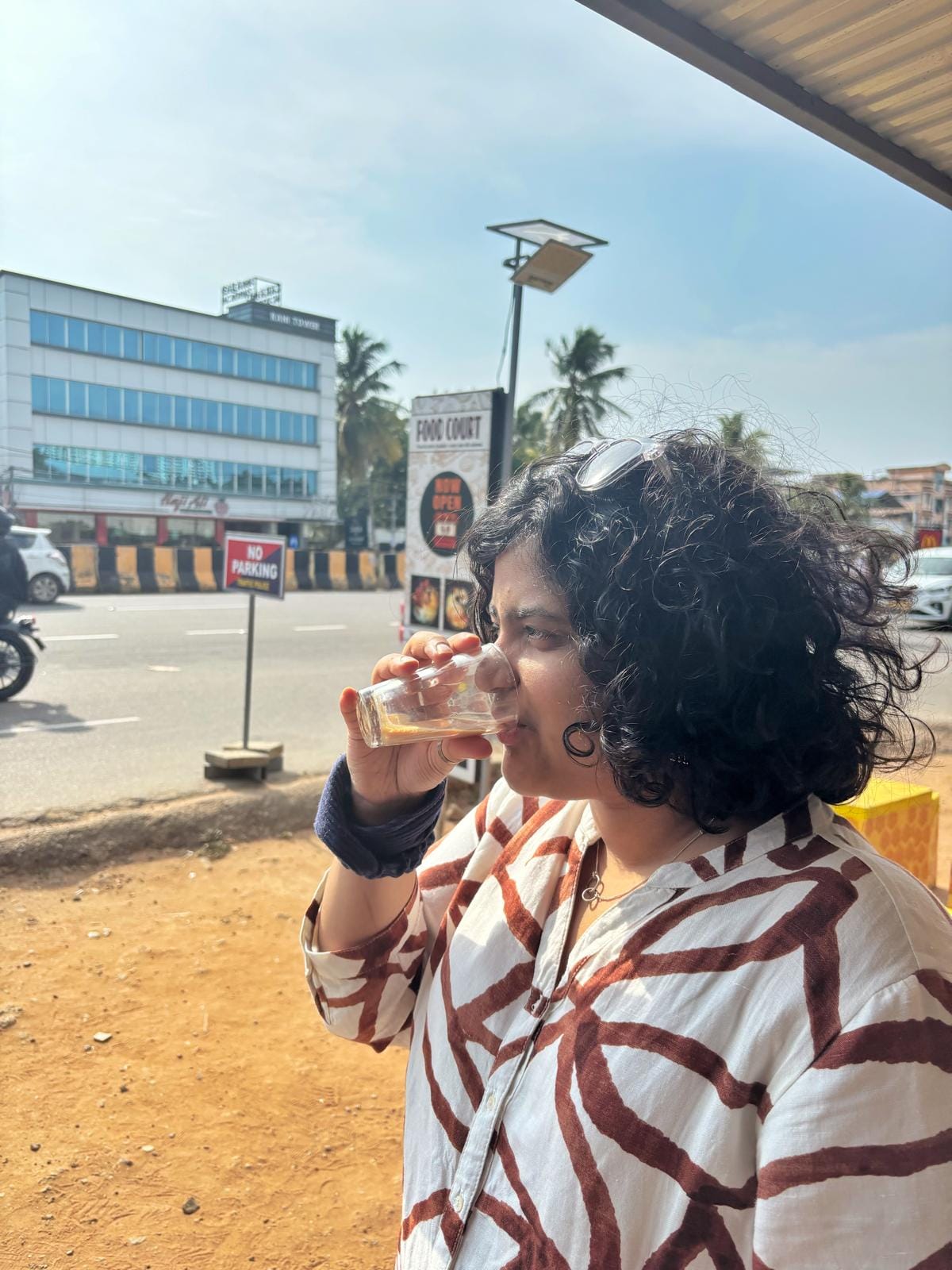
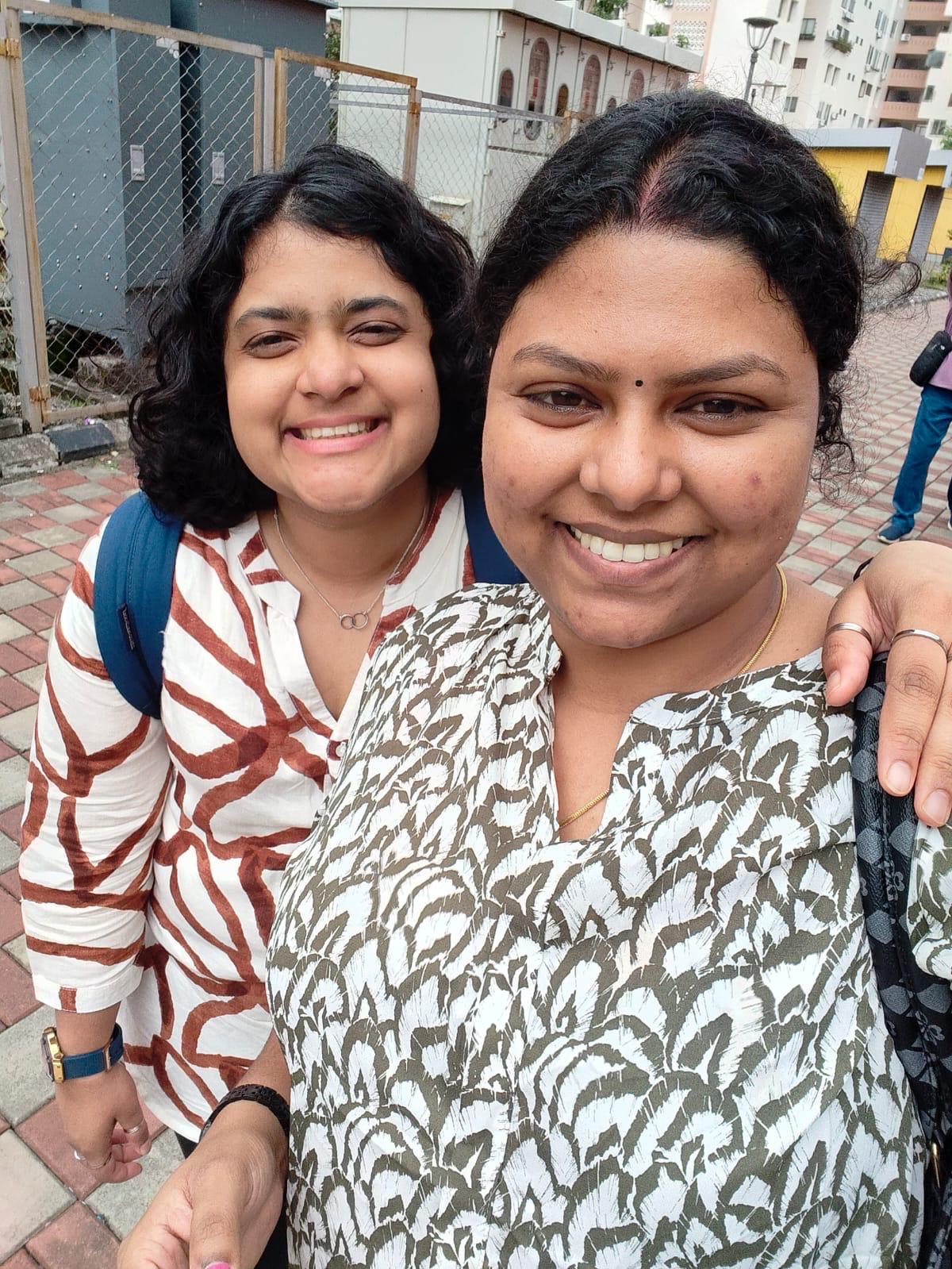
Meeting my Law college friends - at High Court Kerala (pics on left and right; with Namitha, Neethu and Bhagi); and roaming around Trivandrum to taste chai (centre).
And thus, 1-15September was just re-reading, re-writing and revising the thesis. I was physically and mentally exhausted. This phase was utter chaotic - I teared up easily, I was so confused over the littlest things, felt lost and having no purpose in life (I still don't know why I felt all this). My supervisors were super supportive. When I told Professor Viktoria Spaiser how I was seeing error every time I read through my work, she assured that no work is 'perfectly-complete' - and that I just had to let it go. At one point, on 14 September, I was going such an emotional dip, that I wrote to Professor Richard Beardsworth "prof.. I can't do this...", to which he immediately responded: "Susan, just submit it" urging me not to think about anything anymore. And on 15th - I submitted it.
For me, this felt like trance - I was numb when I submitted my thesis.
It took me a week to process what I did and what I completed. The only relief was meeting my friends after 5 long years... remembering old days in Government Law College, Thiruvananthapuram and sharing life stories.
On 30th September, I left to Nuremberg, Germany for a conference at FAU Erlangen-Nürnberg. This was a healing for me; seeing close friends and walking around Nuremberg.
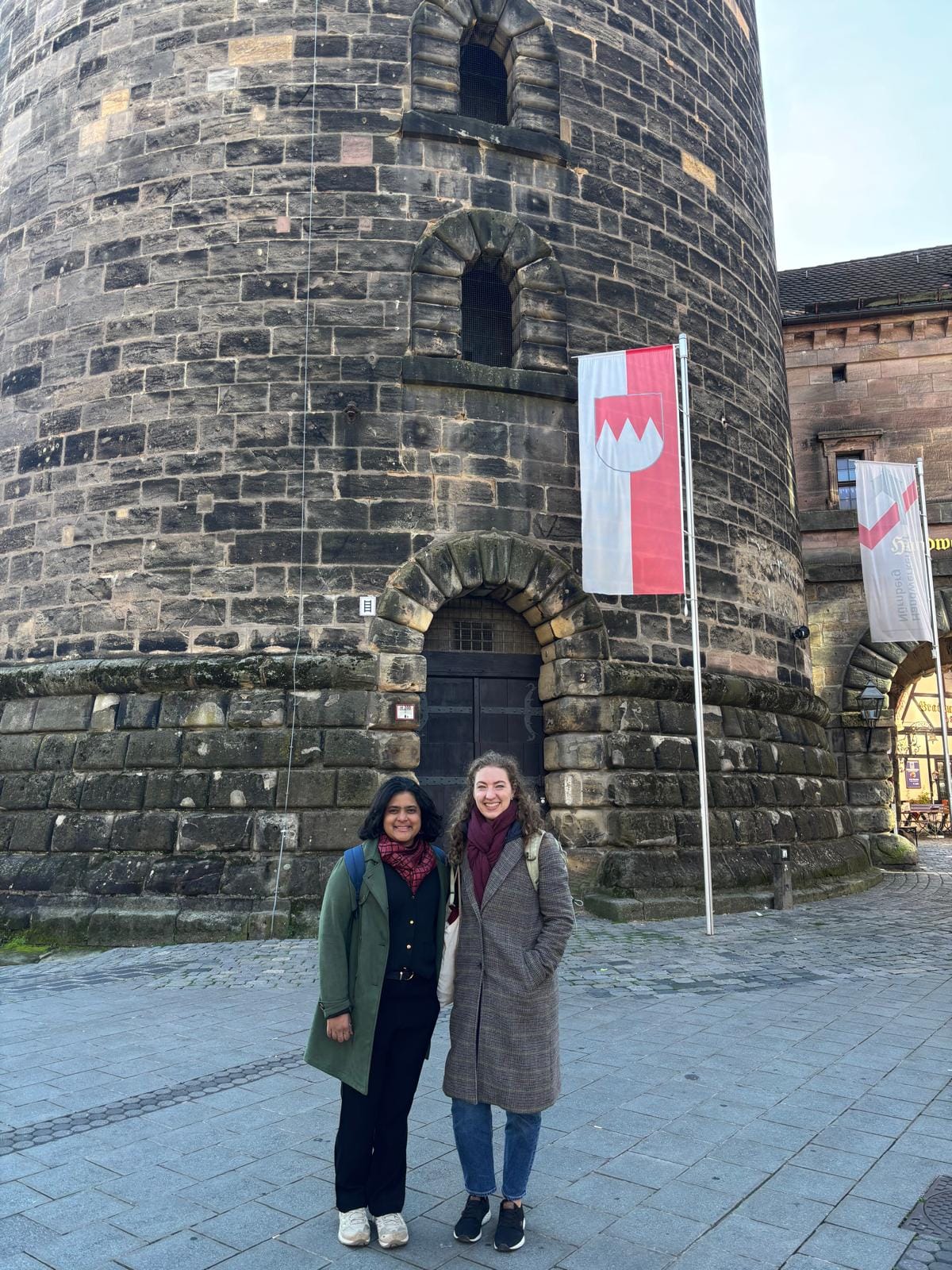
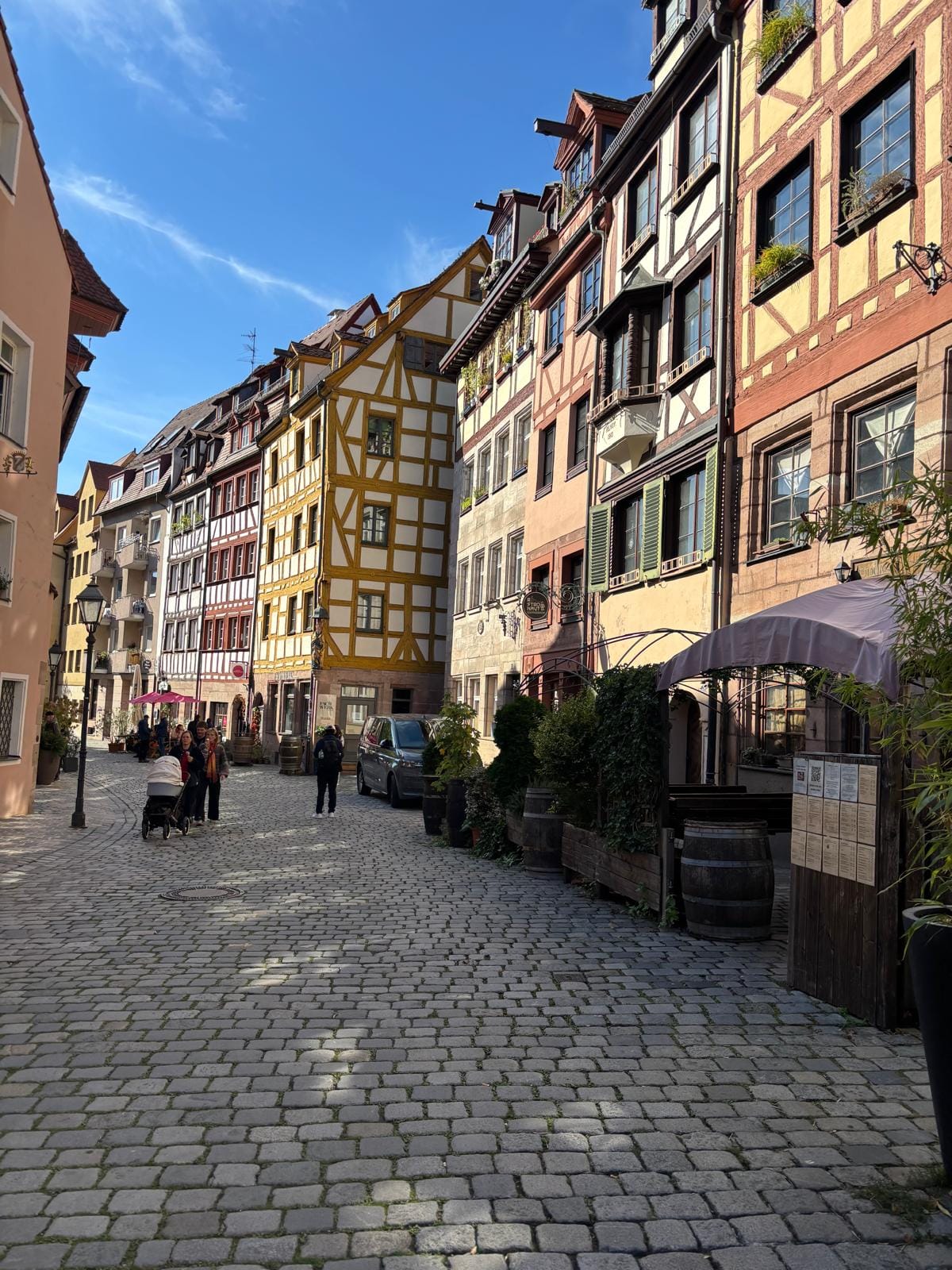
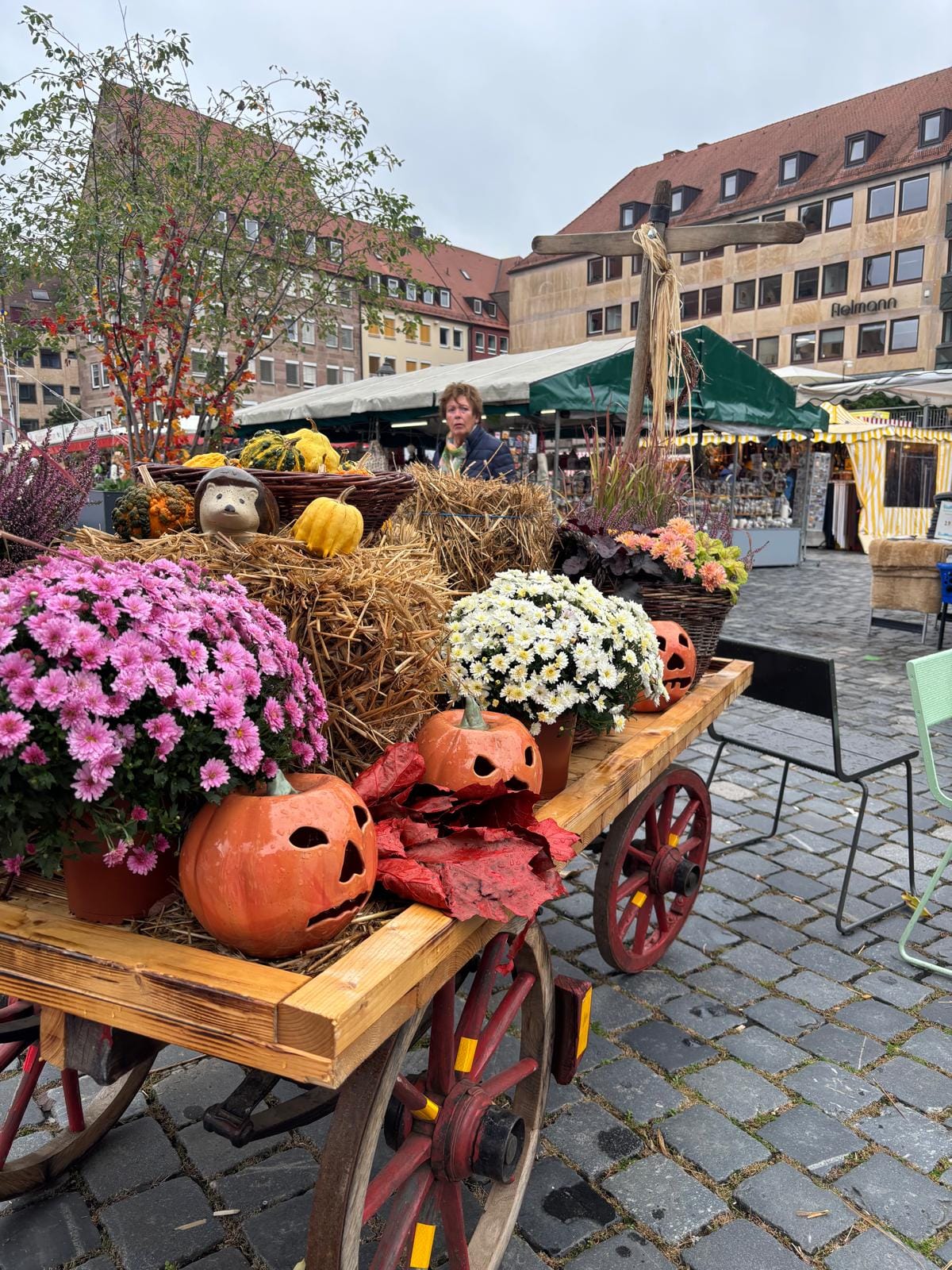
Nuremberg, Germany
I reached Thiruvananthapuram, Kerala on 6th October and started my work as Research Assistant to Dr. Shashi Tharoor, Member of Parliament and Chairman of Committee for External Affairs, India.
Early October, I received word that my PhD viva/defence is scheduled to 26th November. I again set out to Boston, US on 28th October for a guest lecture at Harvard Kennedy School. Later travelling from Boston to Belém, Brazil via Miami for UN Climate Conference as an advisor to the Youth Negotiators Academy (read more about my time in Belém). I was in on air and in Belem from 12-19November.
I reached Leeds on 20th morning; that noon, had a meeting with Professor Beardsworth. I wrote to him earlier that I wanted to see him and that will help me feel grounded, safe, in campus, and ready for my defence. He helped me go through all the main points for the defence. On 21st November I met Professor Spaiser for a coffee too.
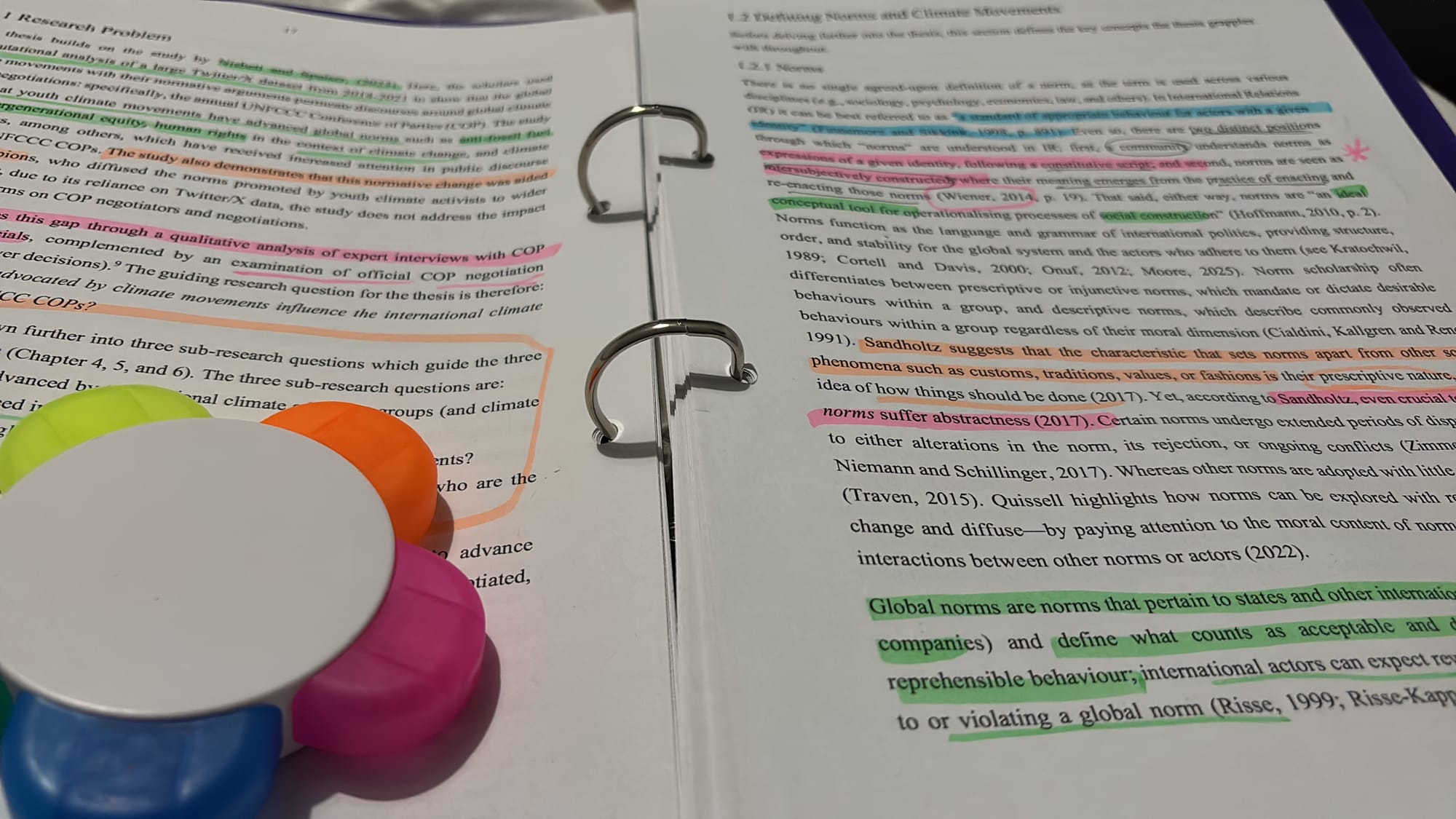
Throughout my time in Leeds, I was blessed to stay with family friends - Joe and Nisu Thomas, and their two little children. Playing lego with them and getting to have quality time to chat over chai - was precious <3
The Viva/Defence
On 25th November, I was scared and nervous.
On 25th late evening, Professor Beardsworth wrote to me: encouraging me to "enjoy the conversation" and that he was confident of me. He asked me not to read the thesis in full, but to keep rehearsing what I already know. That night, I had a light sleep, but forced myself to rest.
On 26th - the defence was empowering than I imagined ❤️

Both Professor Antje Wiener and Professor Jason Ralph, as my examiners, were very kind. They did ask a lot of thought provoking questions: on theory, on methodology, on future directions of research, contributions to International Relations, and more. What made me confident was how they both exemplified the thesis' merit on interdisciplinary - i.e, in Professor Wiener's words, the thesis "was a contribution to IR, but with an analytical rigour which only a legal lens will provide." Why this felt empowering was mainly because, in all these three years, I had difficulty in being confident as to where I belonged: to law, politics, and/or IR? To have endorsement from such a senior Professor that these three disciplines can beautifully converge to rarity of scholarship — made me understand my own value. The examiners nominated my thesis for a couple of prizes. Further Professor Wiener told the panel how she felt this defence was in one of the best 3% she has examined. This warmed my heart, more than what I could express in words.
Both my examiners encouraged me to convert the thesis to a book; which will be my next agenda.
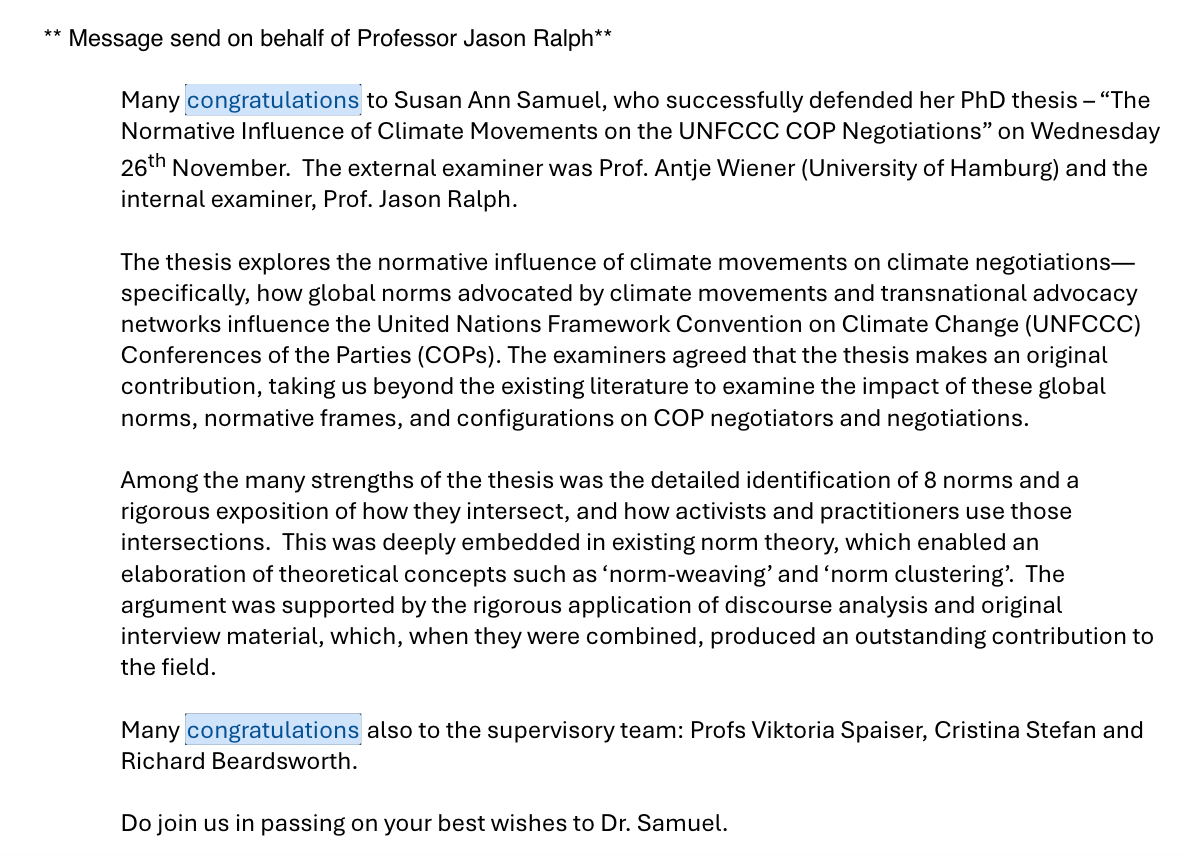
I met my supervisors that noon. I was not just happy, but immensely grateful and blessed to be their student.
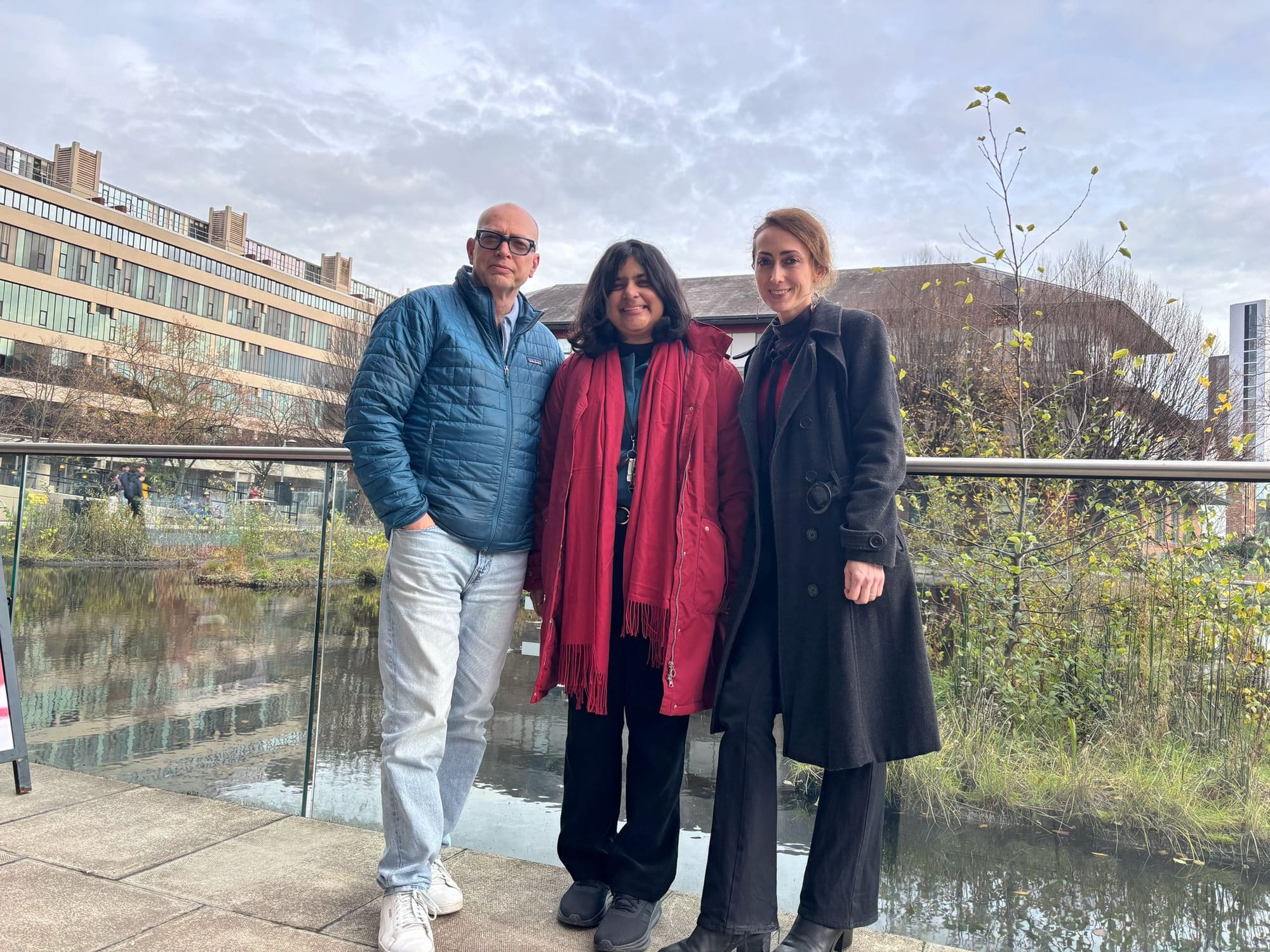
The next day - I met them again to finalise the book project with Priestley Climate Scholars (read here), which we were co-editing together.
On 28th November, I got back home - to Thiruvananthapuram. Alas a next chapter immersing on "real" politics (see more)!
[Disclaimer: PhD journey for every student is different - all what I shared above are personal views and experiences, and cannot be generalised or re-published (even an excerpt or quote) without permission]
